5 The Earthly And Temporary Covenants: The Promise Of The Coming Messiah
A Summary Of The Teaching Video
Some of the points I cover in this teaching video:
The Presbyterians and the Traditional Reformed Baptists believe God established a conditional covenant of grace with sinners (Gen 3:14,15), the substance of which is one and the same with the succeeding covenants, administered differently at various stages in history. The 1689 Federalists, a branch of the Reformed Baptist movement, believe God promised to establish a conditional covenant of grace with sinners (Gen 3:14,15), the pledge of which was renewed in each of the succeeding covenants, and finally established on mount Calvary with the death of Christ. I do not believe the scriptures support this notion of a conditional covenant of grace, and therefore the covenantal frameworks of the foregoing groups are erroneous.
In my view, the biblical covenants should be arranged under two categories: (1) Two spiritual and perpetual covenants—Works and Redemption; (2) Four earthly and temporary covenants—Noahic, Abrahamic, Mosaic and Davidic. The spiritual and perpetual covenants are concerned with the human race and are the basis upon which sinners are in relationship to or with God; the earthly and temporary covenants are concerned with the Jewish race and the physical coming of the Messiah into the world (yes, even the Noahic Covenant).
A Summary Of My View On The Earthly And Temporary Covenants:
I believe the thread which ties together the earthly covenants is the promise of the coming Messiah—First, each covenant was made by God with individuals belonging to the bloodline through which the Messiah would be born; Second, the purpose for each covenant is directly linked to the coming Messiah. It is from this bloodline that God the Father would prepare a body for His Son. And, it is for this reason God set this bloodline apart with special honor (making with them earthly covenants, giving to them special laws and bestowing upon them earthly blessings) during the first 4,000 years of history.
However, with the birth of the Messiah came the end of His bloodline, resulting in the cancellation of these covenants and the termination of the special honor God placed upon the Jewish people as a race. In no sense should these earthly covenants be identified with a conditional covenant of grace, or, to be one and the same with the covenant of works or the covenant of redemption.
The earthly covenants were designed by God to established the boundaries around which He would relate to and bestow earthly blessings upon the Jewish people as a race, in honor of the Messianic bloodline. The spiritual covenants are designed by God to establish the boundaries around which He relates to the non-elect and the elect throughout the course of history.
In this study, I provide a fuller explanation for the first half of the first paragraph of the summary statement.
Jared Smith, Muntinlupa, PH (25/11/2022)
An Outline Of The Teaching Video
The Arrangement Of The Biblical Covenants
A Summary Statement On What I Believe With Reference To The Earthly And Temporary Covenants
I Believe The Thread Which Ties Together The Earthly Covenants Is The Promise Of The Coming Messiah
The Promise Of The Coming Messiah
The Promise Of Genesis 3:15 Has Nothing To Do With A Conditional Covenant Of Grace
If The Promise In Genesis 3:15 Is Equivalent To A Conditional Covenant Of Grace, Then Why Is God Addressing Satan Rather Than Adam?
If The Promise In Genesis 3:15 Is Equivalent To A Conditional Covenant Of Grace, Then Where Is It Recorded That God Is Imposing Saving Faith As Its Condition?
If The Promise In Genesis 3:15 Is Equivalent To A Conditional Covenant Of Grace, Then Where Is The Agreement God Makes With The Sinner?
Each Of The Earthly Covenants Were Made By God With Individuals Belonging To The Bloodline Through Which The Messiah Would Be Born
There Are Two Genealogies Which Link The Messiah To A Single Family Line Through The Course Of History
Noah Was An Ancestor Of Christ
Abraham Was An Ancestor Of Christ
David Was An Ancestor Of Christ
Moses Was Not An Ancestor Of Christ, But The Covenant God Made With Him Was On Behalf Of The Jewish People As A Race/Nation, Out From Which Christ Was Born
The Purpose For Each Covenant Is Directly Linked To The Coming Messiah
The Last Three Covenants—Abraham, Moses And David
The First Covenant—Noah
How Can You Link The First And Second Coming Of Christ With The Promise Given In Genesis 3:15?
A Word Of Caution On How One Should Approach An Understanding Of The Biblical Covenants
It Is A Mistake To Think Of These Earthly Covenants As Directly Linked With A Conditional Covenant Of Grace
It Is A Mistake To Think Of These Earthly Covenants As Directly Linked With The Covenant Of Works
It Is A Mistake To Think Of These Earthly Covenants As Directly Linked With The Covenant Of Redemption
The Four Earthly Covenants Serve As Signposts To The Two Spiritual Covenants
An Example—The Covenant God Made With Moses Points To The Covenant Of Works
An Example—The Covenant God Made With Moses Points To The Covenant Of Redemption
A Final Word
I Am Asking You To Consider A New Way Of Understanding The Biblical Covenants
My Frustrations With The Covenantal Framework Of The Presbyterians And The Reformed Baptists
Creeds And Confessions Are Not Infallible Documents
We Must Examine All Views In The Light Of Scripture And Yield To The Teaching Of The Holy Spirit
An Automated Transcript Of The Teaching Video
I’d like to welcome you back for another study in the Word of God. In our previous studies, I’ve been speaking to you about the biblical covenants and how they’re arranged. Allow me to show you a little review of what we’ve looked at in the previous studies.
The Arrangement Of The Biblical Covenants
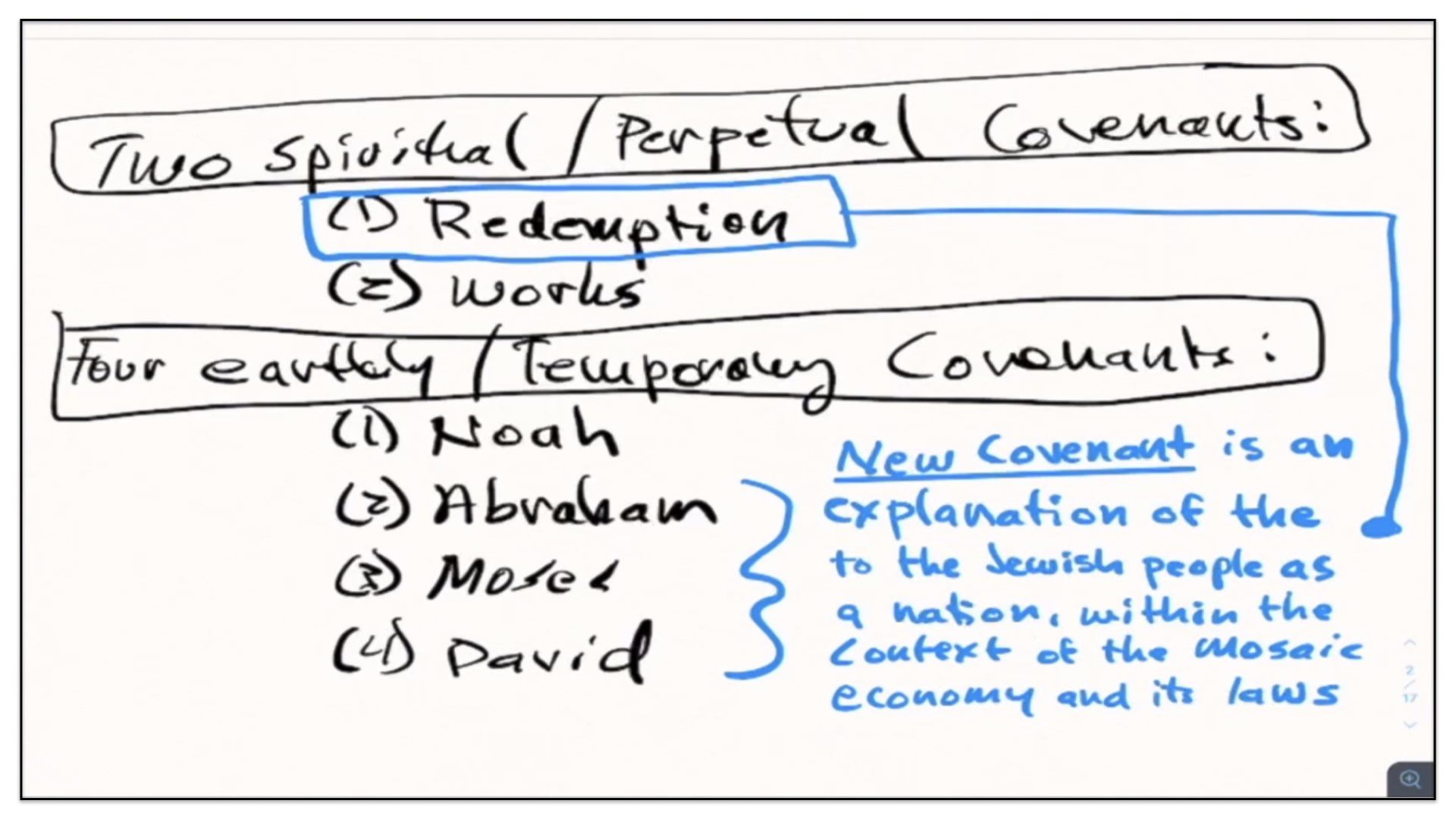
I believe the biblical covenants should be divided into two categories. The first category is the spiritual and perpetual covenants, and there’s two of them—there’s the Covenant of Redemption and the Covenant of Works. The second category is what could be identified as the earthly and temporary covenants, and there’s four of these—the covenant God made with Noah, Abraham, Moses and David. And then of course, there is what the scriptures identify as the New Covenant. Now I don’t believe the New Covenant is an actual covenant, but rather, I believe the New Covenant is an explanation to the Jewish people as a nation of the Covenant of Redemption, within the context of the Mosaic economy and its laws.
A Summary Statement On What I Believe With Reference To The Earthly And Temporary Covenants
Now, in our previous study, I explained the meaning of the two spiritual and perpetual covenants, along with an explanation on why I believe they are perpetual or permanent covenants. My purpose for this study is to share my understanding of the four earthly covenants and to attempt to explain why I believe they are only temporary in nature. Now, this is actually the first time I’m presenting my views on this particular topic, and for that reason, what I’d like to do is give to you a summary statement that I’ve prepared, which will present to you the entirety of my view in a single glance. In this way you get an overview, or a bird’s eye picture, of my understanding of this issue. And then I’m going to back up after reading the statement and I’m going to take the first part of the statement and unpack it within this study, and then we’ll come back for the next couple of studies where I’ll finish unpacking this general statement. So, let me read to you this statement I prepared. This is my general view on what the earthly covenants are and why I believe they are temporary:
I believe the thread which ties together the earthly covenants is the promise of the coming Messiah. First, each covenant was made by God with individuals belonging to the bloodline through which the Messiah would be born; and second, the purpose for each covenant is directly linked to the coming Messiah. It’s from this bloodline that God the Father would prepare a body for His Son, and it’s for this reason God set this bloodline apart with special honor (making with them earthly covenants, giving to them special laws and bestowing upon them earthly blessings) during the first 4,000 years of history that’s leading up to the birth of the Messiah. However, with the birth of the Messiah came the end of this bloodline, resulting in the cancellation of these covenants and the termination of the special honor God placed upon the Jewish people as a race or as a nation. In no sense should these earthly covenants be identified with a conditional Covenant of Grace or to be one and the same with the Covenant of works or the Covenant of Redemption. The earthly covenants were designed by God to establish the boundaries around which He would relate to and bestow earthly blessings upon the Jewish people as a race, in honor of the Messianic bloodline. The spiritual covenants are designed by God to establish the boundaries around which He relates to the non-elect and the elect throughout the course of history.
That’s how I distinguish, you see, between the spiritual and perpetual covenants and the earthly and temporary covenants. Now, it’s a rather long statement, I mean, it’s a summary of what I believe on the issue, but nevertheless, a rather long statement to give you a bird’s eye view of the teachings. What I want to do, as I’ve said, unpack this statement for you, explain each line of the statement, and I would therefore like for this study to take the first paragraph and only the first part of this paragraph, and I’m going to go sentence by sentence and give to you a further explanation on what I’m driving at.
I Believe The Thread Which Ties Together The Earthly Covenants Is The Promise Of The Coming Messiah
The Promise Of The Coming Messiah
Let’s begin with the first sentence of the first paragraph—“I believe the thread which ties together the earthly covenants is the promise of the coming Messiah.” We read of this promise in Genesis chapter 3, and I’m going to read to you this text. Genesis chapter 3 and verse 14 and I’ll read also the 15th verse. These are the words of God—“And the LORD God said unto the serpent (or to Satan), Because thou hast done this, thou art cursed above all cattle, and above every beast of the field; upon thy belly shalt thou go, and dust shalt thou eat all the days of thy life: and I will put enmity between thee and the woman, and between thy seed and her seed; it shall bruise thy head, and thou shalt bruise his heel.” I’d like you to notice, the Lord God promises the Messiah will be born of a woman and will destroy Satan and his works. That’s verse 15—“I will put enmity between thee and the woman, between thy seed and her seed, it shall bruise thy head, and thou shalt bruise his heel.” Here is the promise of the coming Messiah, who will destroy Satan and his works. Now, of course, we know—in fact on this point, I’m going to refer you to the timeline that I had given to you in previous studies.
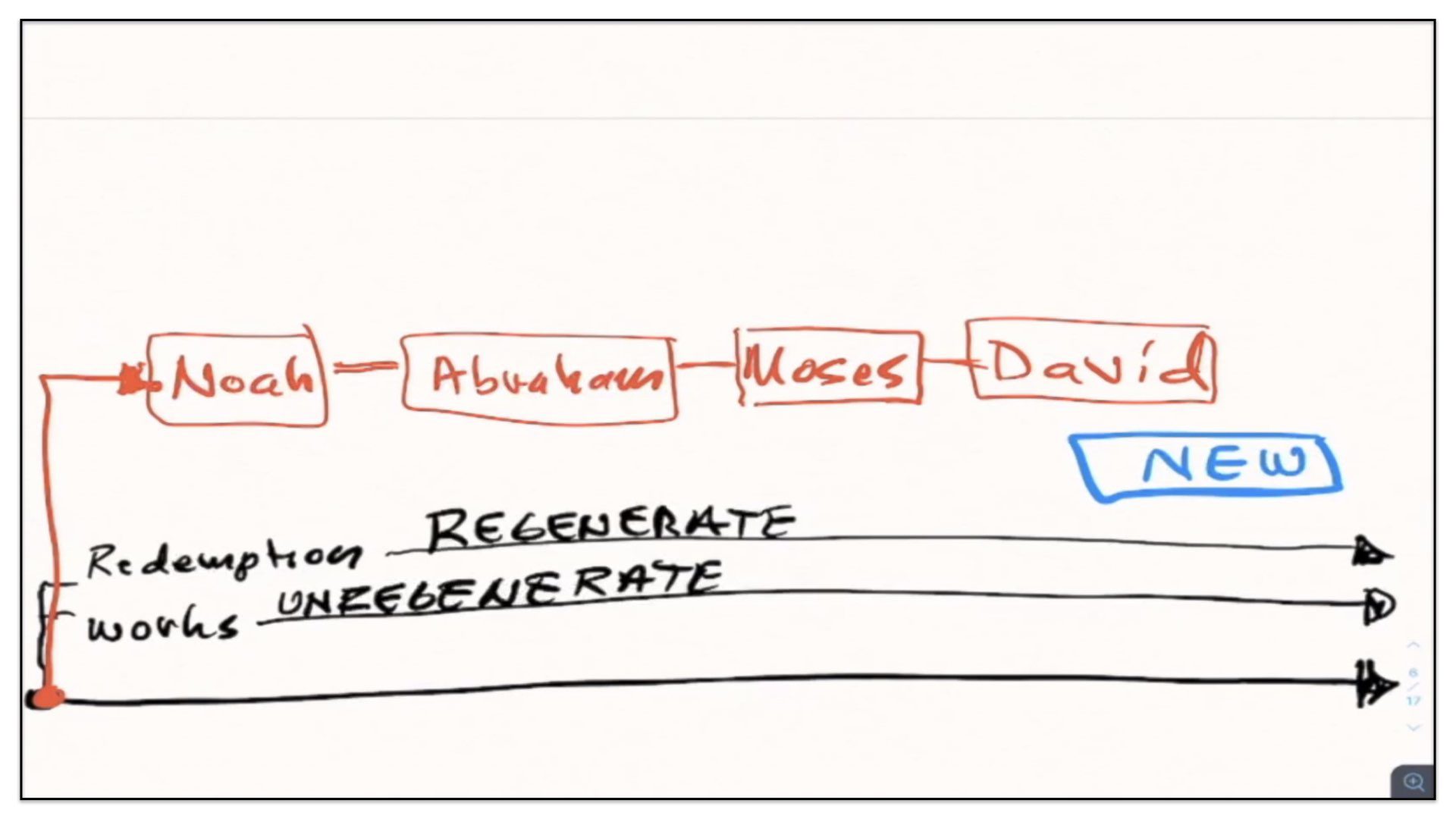
The timeline, just to remind you, we have the timeline at the bottom. And then we have the two spiritual and permanent covenants—the Covenant of Works and the Covenant of Redemption. And then we have the four earthly covenants—Noah, Abraham, Moses and David. And then we have the New Covenant. And I’ve given to you the explanation of what I believe about those things a few moments ago. But that’s the covenants on a timeline and diagrammed.
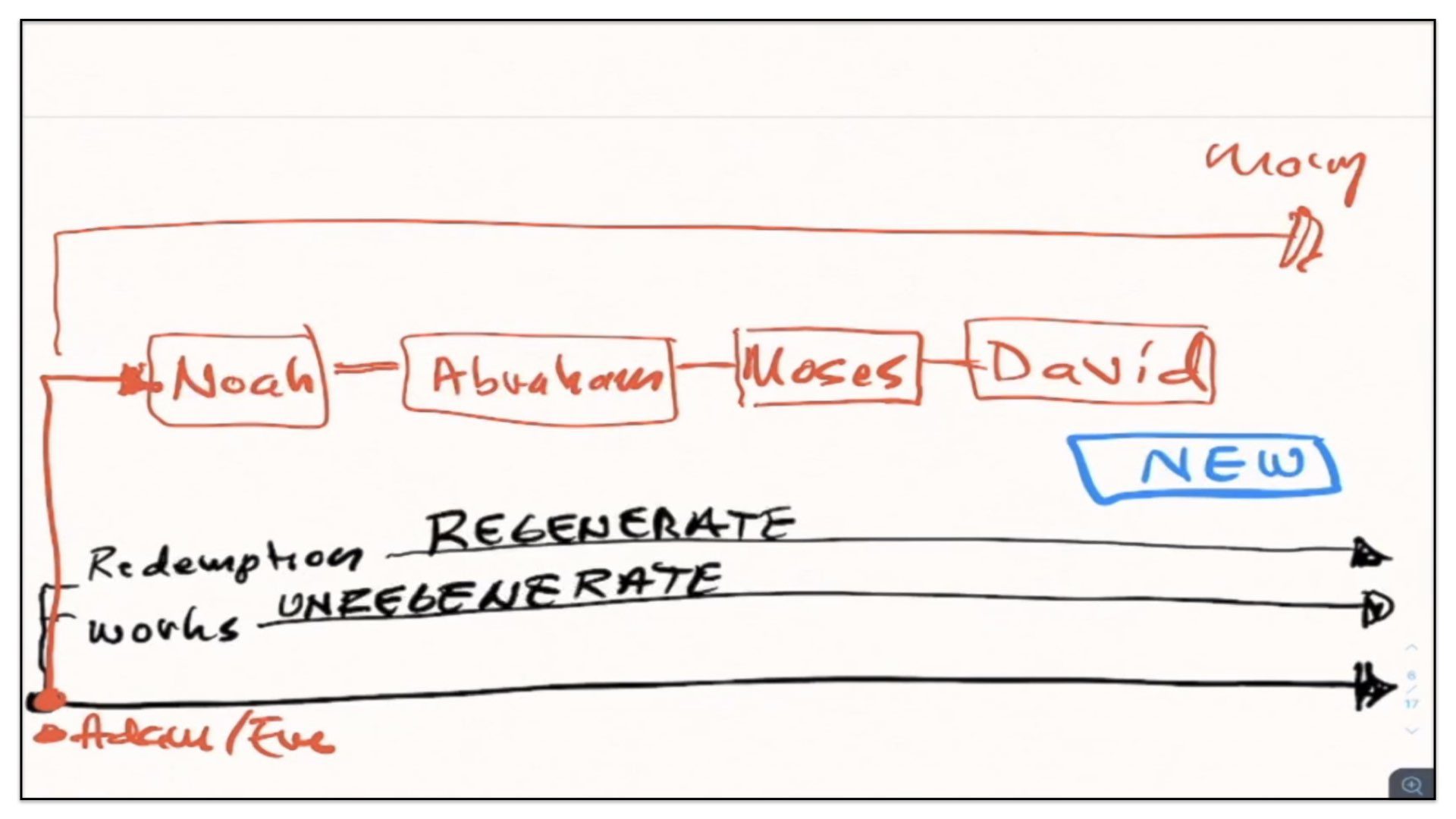
Now, with this diagram and timeline we know, based on Genesis 3:15, and then reading into the four gospel records of the New Testament, we know that between Adam and Eve, and let me just draw a line out here, and Mary, we have the bloodline of the Messiah. We know that the virgin Mary is the mother of the Messiah. And we know that Adam and Eve are the first parents of the human race. So between Adam and Eve and the virgin Mary we have the direct bloodline of the Messiah Himself. And what I’m saying is this—this bloodline is the thread which ties together these earthly covenants—the biological link between Adam and Eve and the virgin Mary. That is the the thread which ties together these earthly covenants.
We could put it like this—this biological bloodline from Adam and Eve to the virgin Mary to the Messiah Himself—this is the hinge upon which the door of the four earthly covenants turn or open. This bloodline of the Messiah is the key which unlocks the door to these earthly covenants. This bloodline is the foundation upon which these earthly covenants are built. These earthly covenants with Noah, Abraham, Moses and David, they are all about the promise of the coming Messiah.
The Promise Of Genesis 3:15 Has Nothing To Do With A Conditional Covenant Of Grace
Now, I know you’re probably saying, “Of course these covenants are all about the coming Messiah. That’s no different than what I’ve heard other groups teach. That’s no different than what I believe myself.” But wait a moment. Actually, if you’re thinking about the viewpoint of groups such as the Presbyterians or the Reformed Baptists, then what I’m saying here is quite different from what they say. You see, when they come to Genesis chapter 3 and verse 15, they see much more to this text than a mere promise of the coming Messiah and the demise of Satan. The Presbyterians and the Reformed Baptists believe that this text is a reference to what they call a conditional Covenant of Grace, made by God with sinners after Adam fell in the garden of Eden.
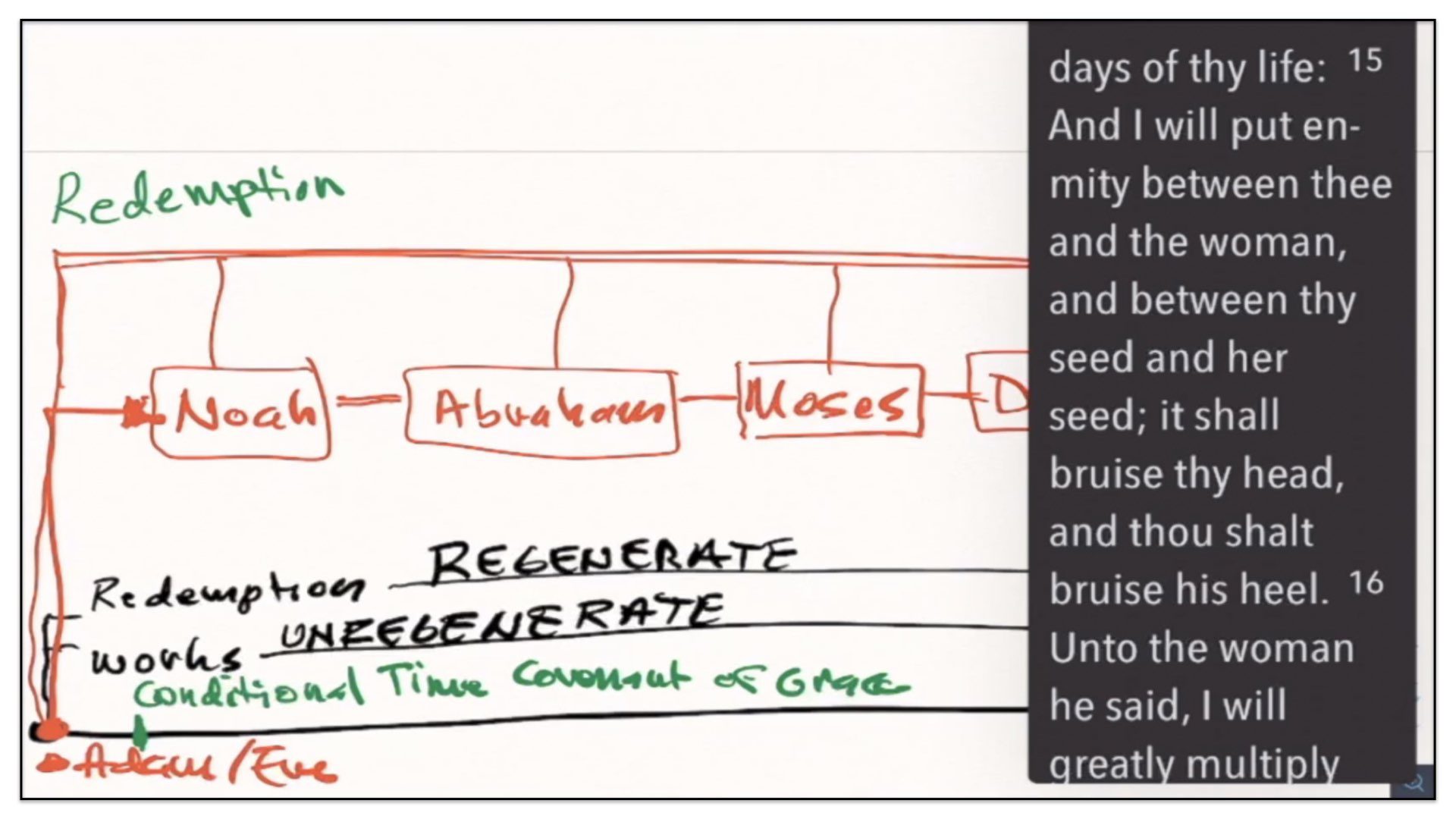
Now, to remind you of their belief. They believe that there is an eternal Covenant of Redemption outside of time between the Father, Son and Spirit. But then there is an additional conditional time Covenant of Grace—maybe I’ll just put those words down here—a conditional time Covenant of Grace that God makes with sinners after Adam fell in the garden of Eden. And they therefore believe there’s basically two salvic covenants—one from eternity between the Persons of the Godhead and another in time between God and the sinner.
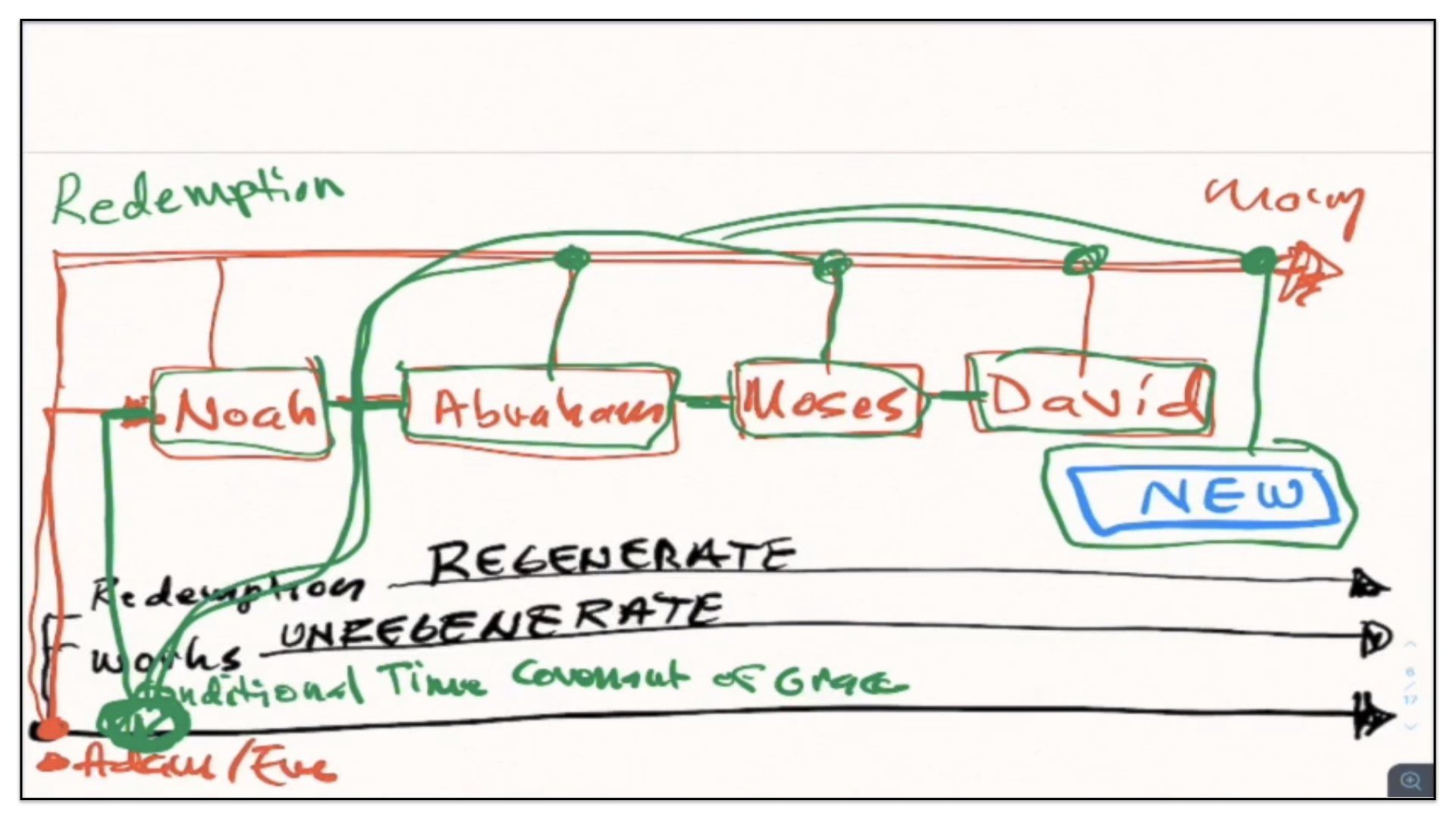
And it’s based on this concept that the Presbyterians and Reformed Baptists believe that this conditional time Covenant of Grace is republished through these other earthly covenants, so that the covenant God, for instance—I’ll leave the Covenant of Noah on its own because there’s a diversity of views on that—but when it comes to the covenant God made with Abraham, and with Moses and with David, traditional Reformed Baptists and Presbyterians believe that the covenant God made with Abraham is the same as this conditional Covenant of Grace they believe God made in Genesis 3:15 with Adam. And they believed the covenant God made with Moses is also the same as the conditional covenant God made with Adam in the garden of Eden and they believe with David. And then, with the New Covenant, they believe that the New Covenant is also the same conditional Covenant of Grace.
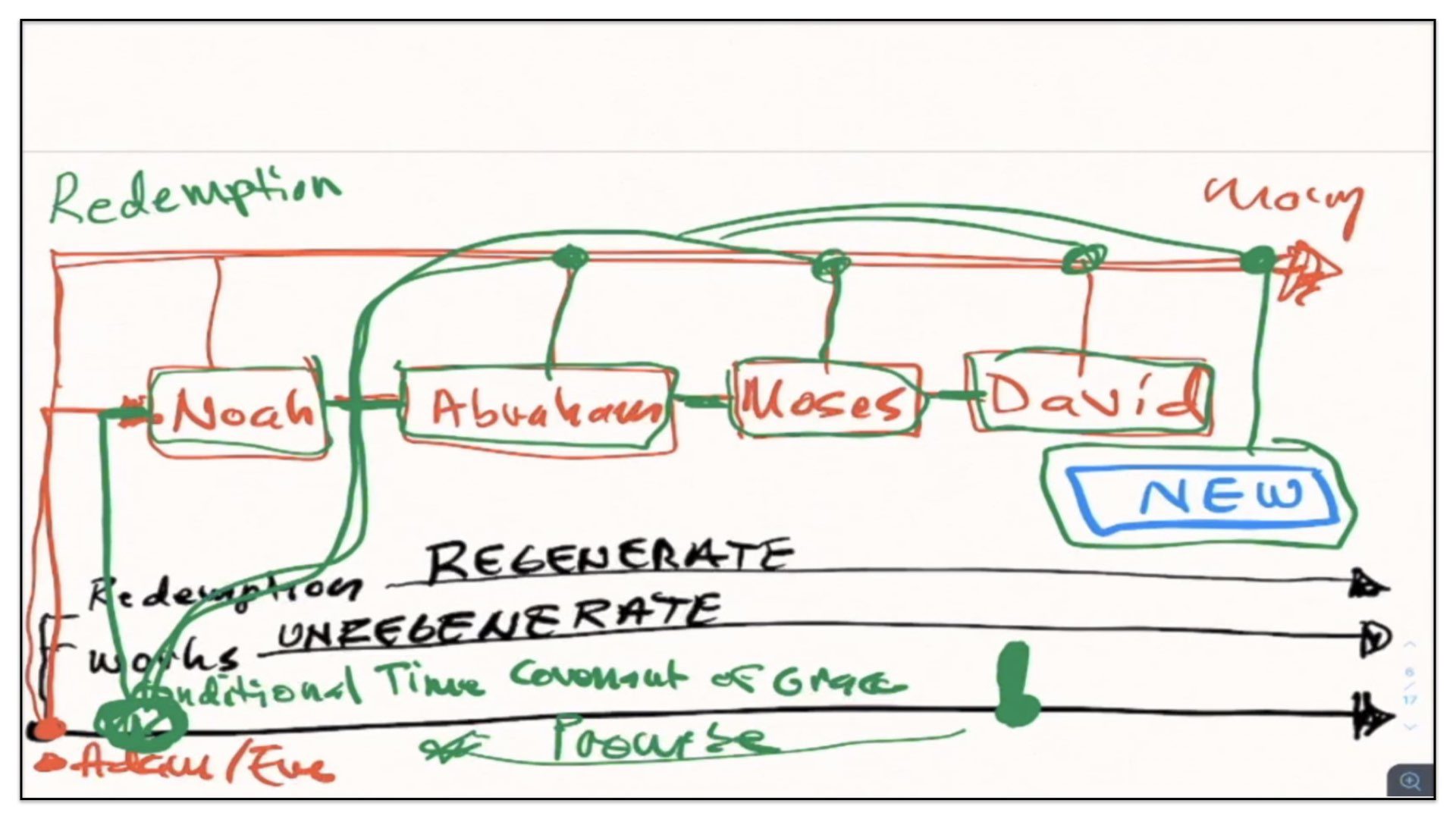
Now, the 1689 Federalists—they’re a new group among the Reformed Baptist believers—they take a slightly different view. They agree that there is a conditional time Covenant of Grace, but they don’t believe it was established by God with Adam in the garden of Eden. Rather, they believe it’s established by God with Christ on Calvary. Here, at that point in history. And everything prior to that is only a promise of this conditional time Covenant of Grace. Now, having stated these views for you, if you look back at the text, Genesis 3:15, do you see therefore the difference between these groups? And the view that I’m setting out for you—I’m saying that Genesis 3:15 is a promise of the coming Messiah and the focal point being on the bloodline, the biological link, between Adam and Eve and the Messiah. Whereas the Presbyterians and the Reformed Baptists, they believe that Genesis 3:15 is all about a conditional Covenant of Grace, or God’s promise of a conditional Covenant of Grace, and that is not my position at all.
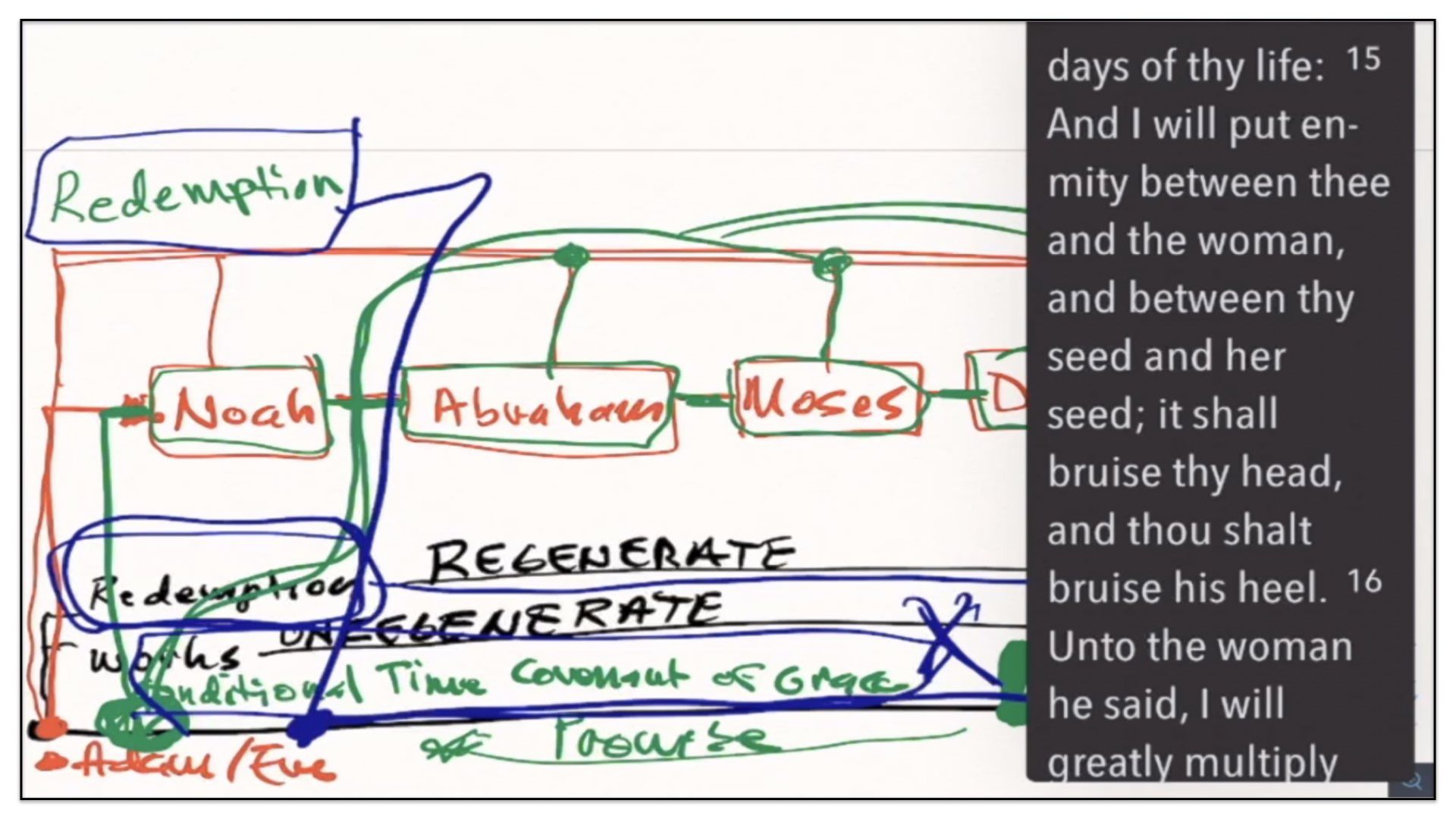
I have mentioned to you in the previous studies, I do not believe the scriptures support this view of a conditional Covenant of Grace. The scriptures don’t support that in my view. Rather, I believe the scripture set forth a Covenant of Redemption from eternity which God works out through the course of history. That’s what this Covenant of Redemption is here. God works that covenant out through process of time. He doesn’t establish another covenant, a salvic covenant, but rather, this is the one and only covenant of salvation—the Covenant of Redemption. So that, whatever God is saying in Genesis 3:15, He’s not establishing a conditional Covenant of Grace. And neither is he establishing the Covenant of Redemption, for the Covenant of Redemption is established before the foundation of the world.
If The Promise In Genesis 3:15 Is Equivalent To A Conditional Covenant Of Grace, Then Why Is God Addressing Satan Rather Than Adam?
So then, what is it that God is doing in Genesis 3:15? Well, let me just point a few things out to you by taking a closer look at the text. Watch this and watch it carefully. If this promise in Genesis 3:15 is equivalent to a conditional Covenant of Grace, then let me ask you a question—why is God addressing Satan, rather than Adam? Have you ever thought about that? In fact, if God is indeed establishing a covenant here in this text, then it must be acknowledged that He’s establishing this covenant with Satan, because God is addressing Satan. He’s speaking to Satan. Don’t you see? This is a promise God is making to Satan. A promise that the Messiah will be born and will destroy him. This has nothing to do with a covenant that God is making with Satan, or with anybody else. That’s the first thing I would point out to you about this text.
If The Promise In Genesis 3:15 Is Equivalent To A Conditional Covenant Of Grace, Then Where Is It Recorded That God Is Imposing Saving Faith As Its Condition?
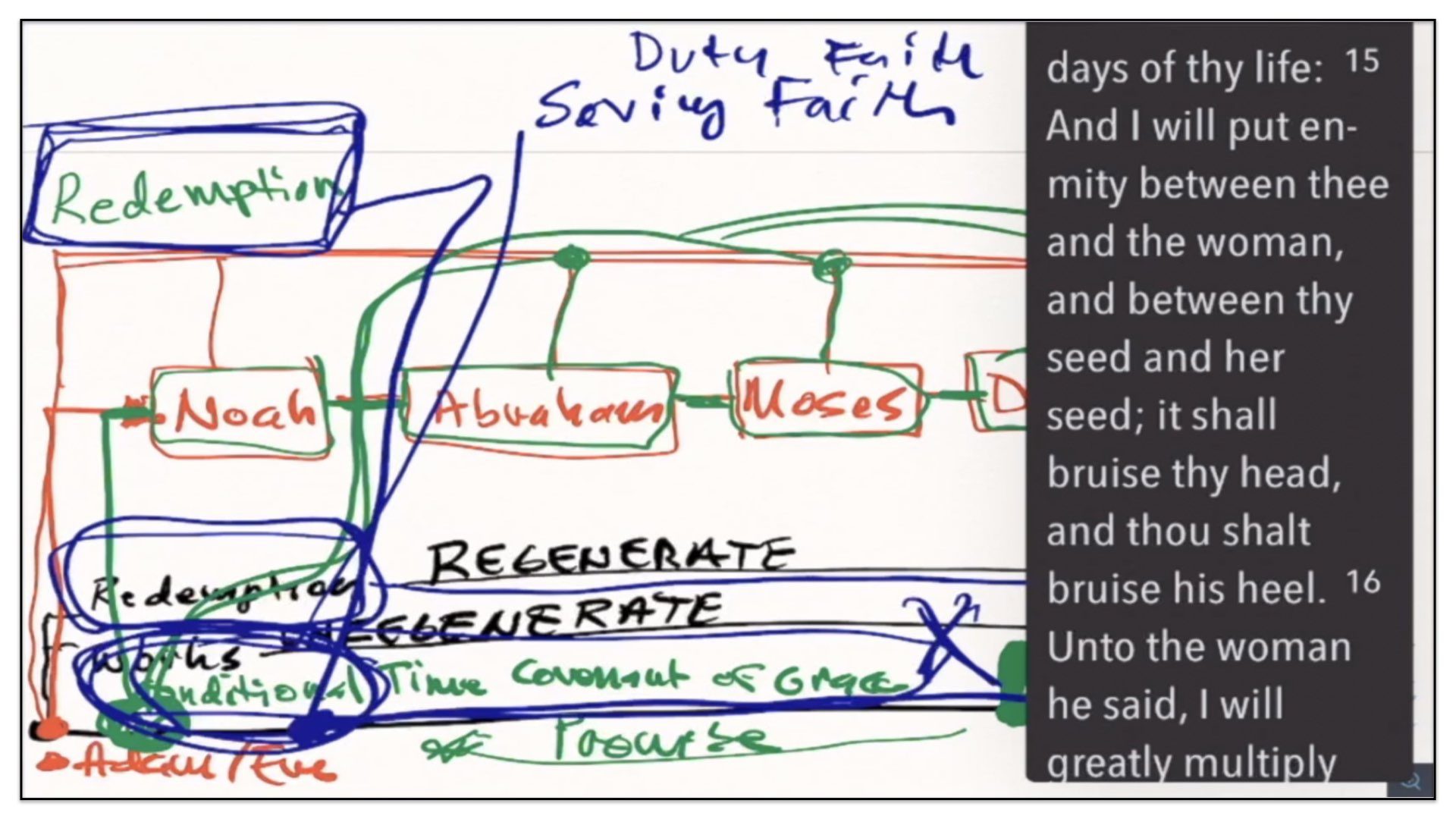
Here’s a second thing I would point out—if this promise God makes in Genesis 3:15 is equivalent to a conditional Covenant of Grace, then where is it recorded in this text that God is imposing saving faith as a condition to this Covenant of Grace? You see, when I say that they believe in a conditional Covenant of Grace, they believe the condition is saving faith in Christ—that in order to be saved, the sinner must seal the deal within this agreement by believing savingly on the Lord Jesus Christ. This is called duty-faith. And the question I’m putting to the Presbyterians and the Reformed Baptists, and to those of you that are on the fence and looking into these issues for yourself and you’ve made no determinations or come to any definite conclusions—the question is, in Genesis 3:15, where is God imposing upon Adam, Eve or any other sinner a condition of saving faith for their salvation? You don’t find it here in this text, which means I come back to the same point. I’ve mentioned that text very clearly is a promise God makes to Satan about the Messiah coming into the world through the biological line of a woman, and that this Messiah will destroy Satan and his works.
If The Promise In Genesis 3:15 Is Equivalent To A Conditional Covenant Of Grace, Then Where Is The Agreement God Makes With The Sinner?
The third thing I’ll point out to you with reference to this text—if this promise God makes in Genesis 3:15 is equivalent to a conditional Covenant of Grace, then tell me, where is the agreement God makes with the sinner?Remember, a covenant is an agreement between two or more people with certain obligations binding them together. Where is it stated anywhere in this text that God is making an agreement with Adam and that Adam acknowledges or is present to hear it? We assume Adam may have been present to hear the promise given to Satan, but God is certainly not addressing Adam and making an agreement with him. He’s addressing Satan and making a promise to the Devil.
So, it brings me to the conclusion—that Genesis 3:15 has nothing to do with the establishment of any type of covenant, but rather, it is quite simply a promise that the Messiah is going to be born of a woman. There’s going to be a biological family line that can be traced from Adam and Eve to the Messiah Himself. And it’s that biological bloodline that is the key, that’s the thread, which links together all of these earthly covenants.
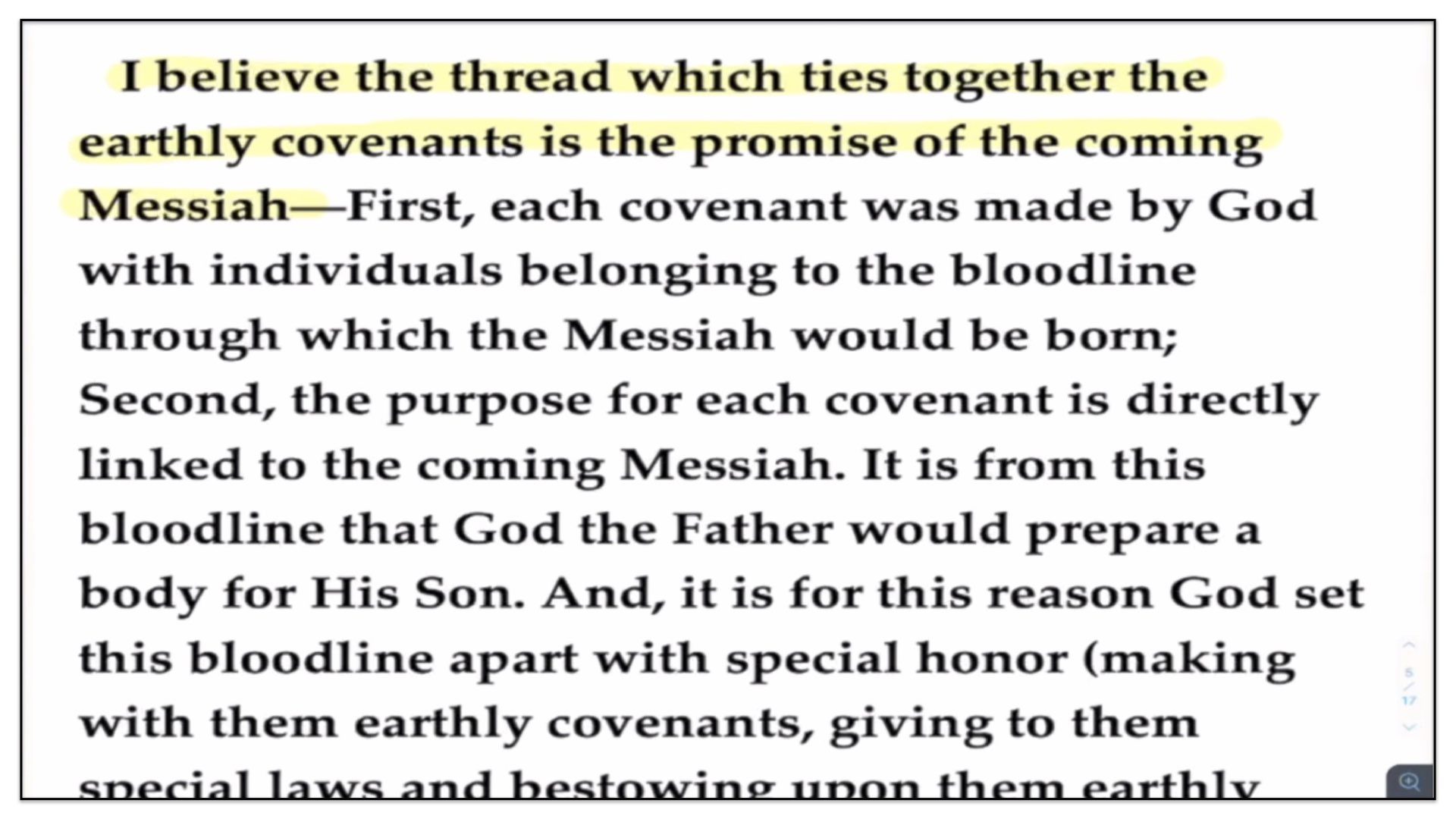
Well, with that said, I’m going to take you back to my main statement. Let me read for you again what I’ve just attempted to explain—“I believe the thread which ties together the earthly covenants is the promise of the coming Messiah.” It has nothing to do with the covenant—it’s about the promise that the Messiah is going to be born of a woman.
Each Of The Earthly Covenants Were Made By God With Individuals Belonging To The Bloodline Through Which The Messiah Would Be Born
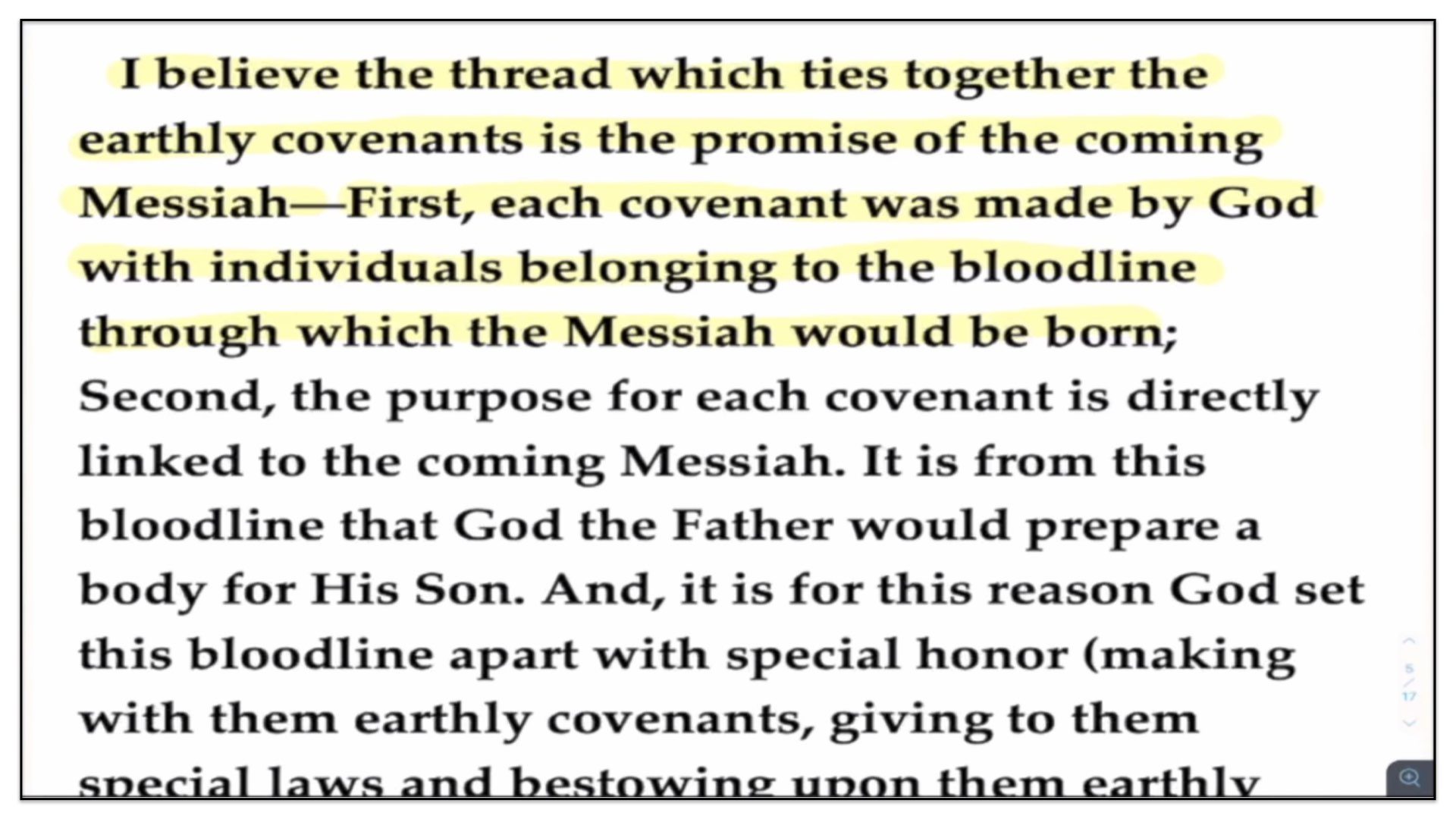
Now, watch this. “First, consider each of these earthly covenants God made with individuals belonged to the bloodline through which the Messiah would be born.” Think about this. Each of these earthly covenants was made by God with individuals who belong to the bloodline through which the Messiah would be born. Keep in mind this bloodline that I keep referring to, this promise of a bloodline to the Messiah. And now look at the four covenants, and these people belong to that specific lineage.
There Are Two Genealogies Which Link The Messiah To A Single Family Line Through The Course Of History
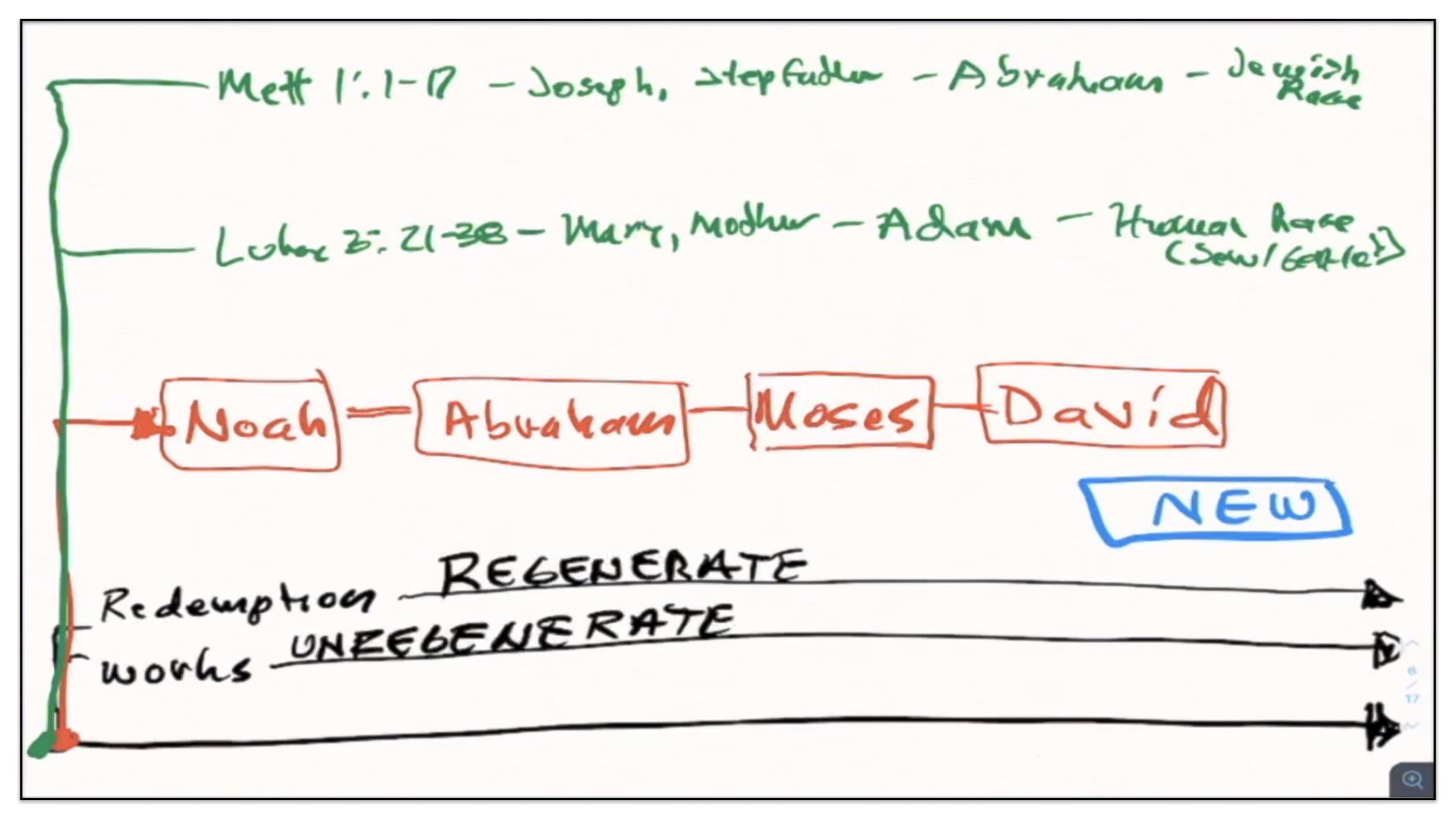
Let me take you back and I’m going to use a fresh set of notes for this timeline and diagram of the four earthly covenants. Watch this—there, let me change the color; I’ll use the color green—Watch. There happens to be two genealogies given in the New Testament which link the Messiah to a single family line through the course of history. The first genealogy is recorded in Matthew chapter 1 verses 1 through 17. This is the family line which belongs to Joseph, the the legal stepfather of the Lord Jesus Christ, of the Messiah. The second genealogy is recorded in Luke chapter 3 and verses 21 through 38. Now this lineage belongs to Mary, the biological mother of the Messiah. For a moment, just capture this picture—two genealogies and only two of them are recorded in the New Testament scriptures. One in Matthew, the other in Luke. In Matthew, it is Joseph the legal stepfather of the Messiah, and it gives to us his family lineage; and Luke, it’s Mary the biological mother of the Messiah, and it gives to us her family lineage. Are you following? Watch this. The family line belonging to Joseph reaches back to Abraham, arranging the Messiah’s ancestors into three categories of 14 generations each. It’s a very interesting genealogy. However, the family line belonging to Mary, it reaches back to Adam, and it doesn’t arrange the ancestors into any neat categories. It just gives a successive listing from Mary, all the way back to Adam. Now, it’s helpful to know, when you come to the gospel according to Matthew, Matthew was Jewish, and he was one of the Apostles of the Lord Jesus Christ, and is therefore not surprising that when he wrote his gospel record, he had in mind the Jewish people as a race. The Jewish race was in his mind. And therefore he was addressing them particularly, and he wanted to prove that Jesus of Nazareth is the King of the Jews. That’s his purpose for writing the gospel record, which perfectly aligns with the genealogy given in Matthew chapter 1. Luke, on the other hand was not Jewish. He was a Gentile. Neither was he an Apostle of the Lord Jesus Christ. You’ll remember, he was actually a companion to the Apostle Paul during the evangelistic campaigns. It should therefore not be a surprise that when Luke gave to us his gospel record, his concern was not so much with the Jewish people as a race, but rather, as a Gentile, Luke’s concern was with the human race at large, including both Jew and Gentile. And therefore Luke’s whole purpose in writing his gospel record was to prove that Jesus of Nazareth is the Son of Man, He is the second or last Adam, which perfectly aligns with the genealogy given by Luke, in Luke chapter 3.
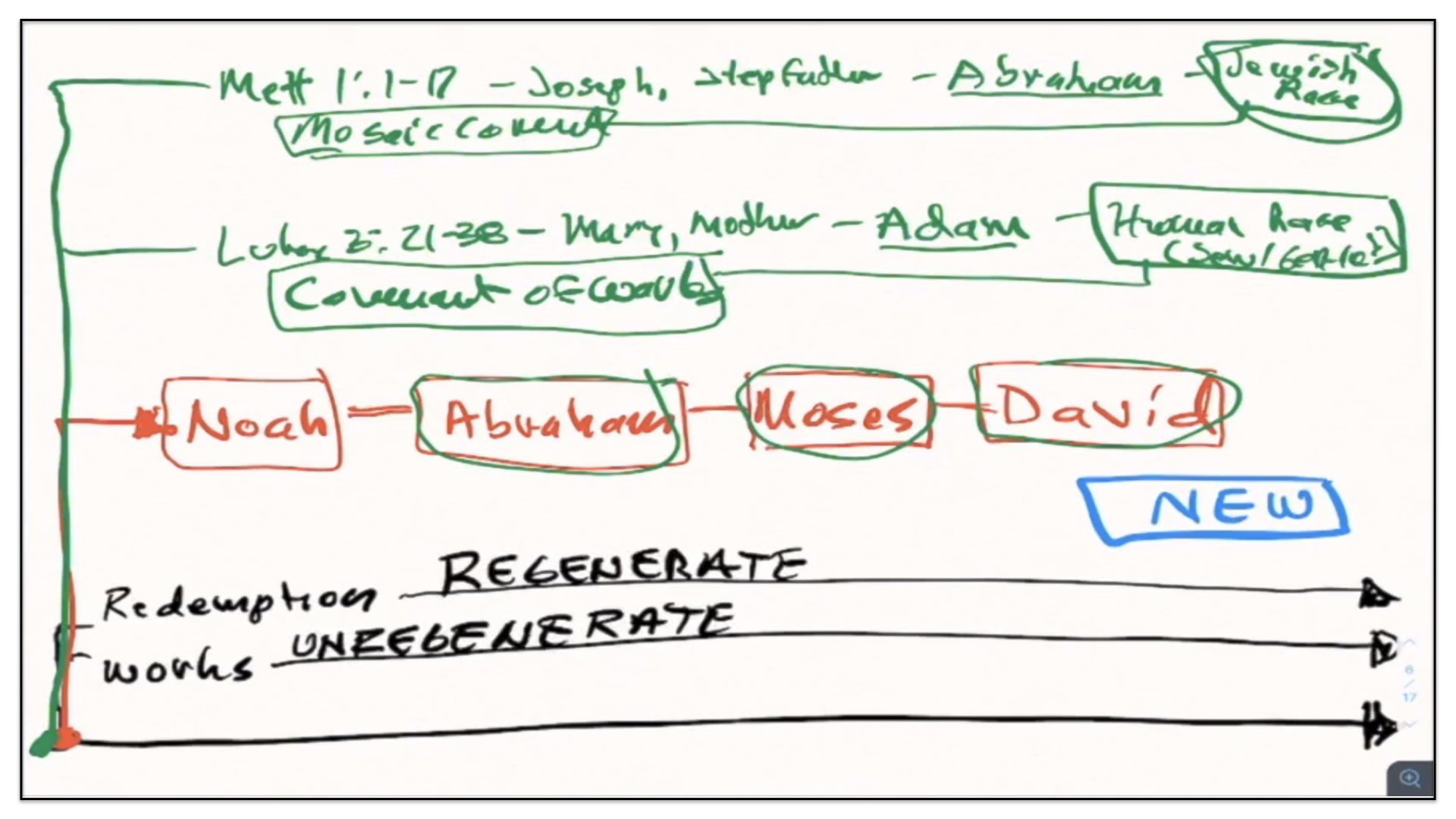
Now, watch this. By bringing together these two genealogies, we discover the Messiah’s family line belonging to His stepfather Joseph, it proves that the Lord Jesus Christ, being the Son of Abraham, came into the world under the authority of the Mosaic Covenant, because of course, the Messiah Himself was Jewish. Whereas the Messiah’s line, which belongs to Mary the biological mother of the Messiah, this proves to us that the Lord Jesus Christ, having come into the world being the Son of Adam, came under the authority of the Covenant of Works, for not only was He Jewish, but He was a member of the human race at large. And do you see how these two covenants relate to the various peoples of the world? The Mosaic Covenant, an earthly and temporary covenant, is linked directly with the Jewish people as a race, whereas the spiritual and perpetual Covenant of Works, is linked with the human race at large.
So, I hope you can see this—the Messiah was brought under the authority, not only of the earthly covenants God made with Abraham, Moses and David, for Himself was Jewish, but also, the Messiah was brought into the world under the authority of this permanent covenant, this spiritual Covenant of Works. Christ Himself was not unregenerate, rather, Christ stood as the second Adam before Adam fell in the garden of Eden, without sin. So Christ Himself, the Messiah, came into the world without sin and He stood in the same position that Adam stood as a covenantal head. Whereas Adam stood as the covenantal head of the Covenant of Works, Christ the Messiah, He stood as the covenantal head of the Covenant of Redemption. And of course, it’s under this Covenant of Works, the Christ fulfilled, and as the covenantal head of the Covenant of Redemption, that Christ earned for His people eternal salvation by His perfect obedience to this law under the Covenant of Works and the sacrificial offering of His body. His body, keep that in mind, the biological link between Adam and Eve and the Messiah, the body that the Father had prepared for Him, it’s that sacrificial offering of His body on the cross, that there is an atonement for sins. And you see, my dear friends, this is how I’m attempting to link all of this together when it comes to the subject of the earthly covenants. It’s all based on the promise of the coming Messiah, specifically of the bloodline through which He will be born. I’m pointing these things out to you because these are the generational points which bridge together the Old and New Testament scriptures. In Genesis chapter 3 and verse 15, we have the promise given by God that the Messiah will be born of a woman. We know that Adam and Eve are the first parents in this family line. We then have in Matthew chapter 1 verses 1 through 17, and Luke chapter 3 verses 21 through 38, we have in these two genealogies the men, and some women are also listed, of the particular ancestors through which the Messiah will be born.
Noah Was An Ancestor Of Christ
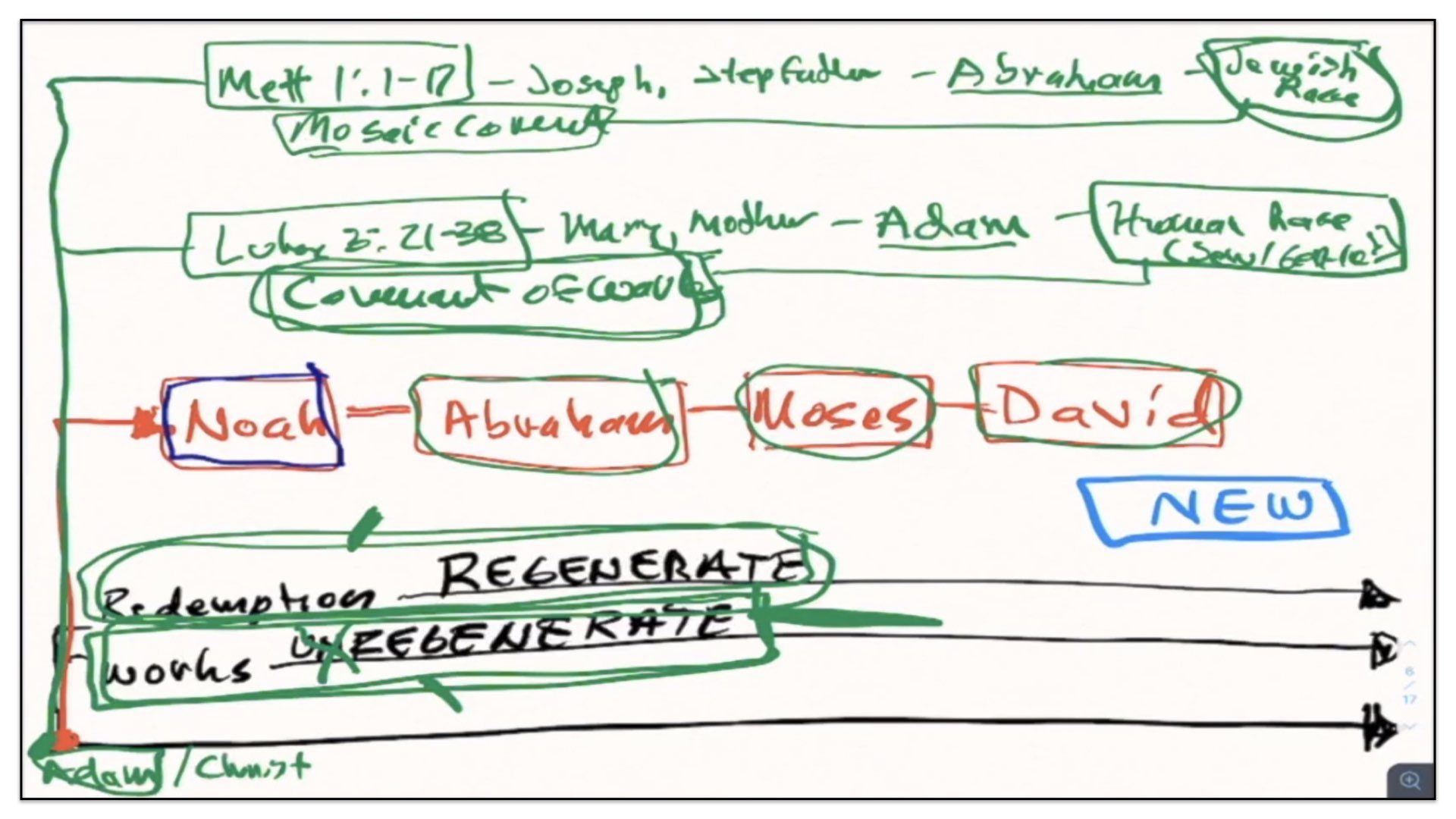
Now, just to highlight for you—I’ll choose a different color pen—the particular ancestors that concern us for this study. We have Noah himself, one of the men with whom God made an earthly covenant. Noah was a direct ancestor of the Messiah. Although, of course, Noah was not Jewish. That should be pointed out. The Jewish race began with Abraham. Abraham is the father of the Jewish race. Abraham was born about 350 years after God made this covenant with Noah. But, having said that, Noah is a direct ancestor of the Messiah. So, this covenant, this earthly covenant, was made by a particular person linked with the ancestors of Christ himself.
Abraham Was An Ancestor Of Christ
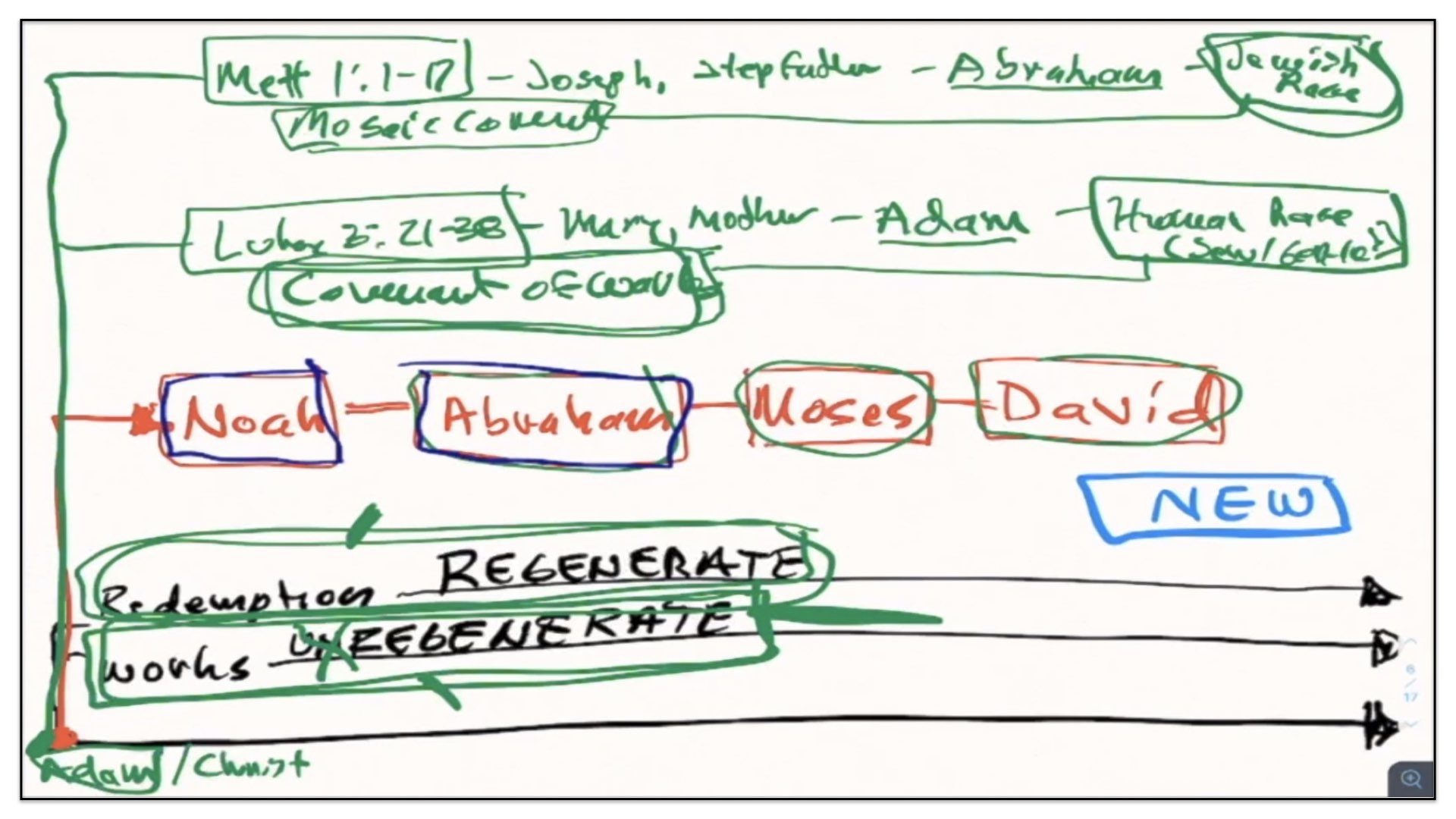
What about this covenant God made with Abraham? Well, as I just said, Abraham is the father of the Jewish race. And yes, he is a direct descendant of the Messiah Himself.
David Was An Ancestor Of Christ
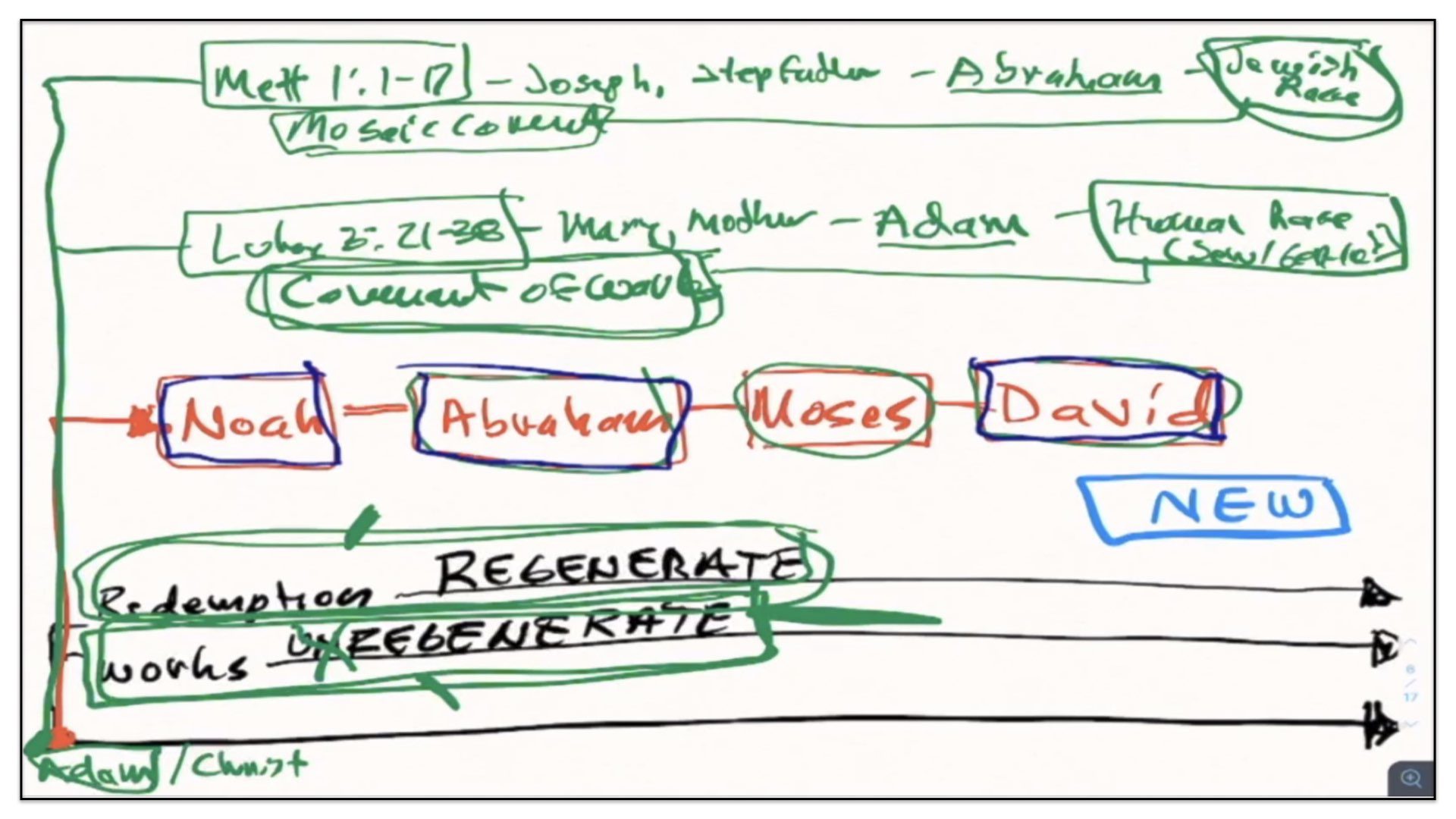
And then, of course, I want to highlight for you David. David is a direct ancestor of the Messiah, the greatest of Israel’s Kings.
Moses Was Not An Ancestor Of Christ, But The Covenant God Made With Him Was On Behalf Of The Jewish People As A Race/Nation, Out From Which Christ Was Born
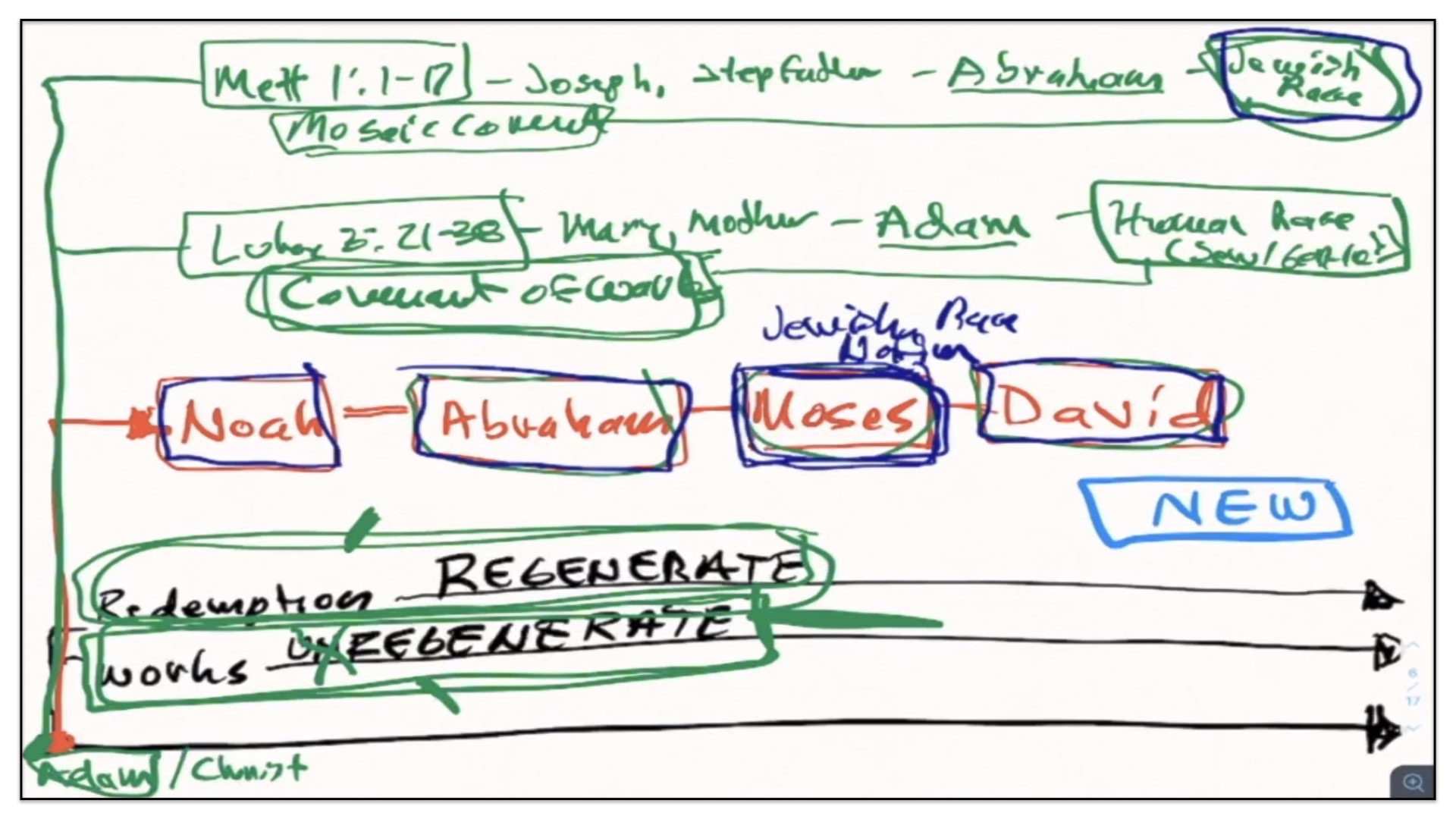
But now, we come to a little sticking point, because we have that of Moses. And if you’re thinking, “Well, Moses is not a direct ancestor of the Messiah, is he?” You’d be correct. Moses belonged to the tribe of Levi, whereas the Messiah’s family tree came through the tribe of Judah. However, when God made this covenant with Moses, it was not a personal covenant. It was a national covenant. God made this covenant with Moses on behalf of the Jewish people as a race, turning them into a nation—the national racial covenant. And because the Messiah belongs to the Jewish people as a race, the Messiah is Jewish, so this covenant God made with the Jewish people encompasses, includes, the family line through which the Messiah would be born.
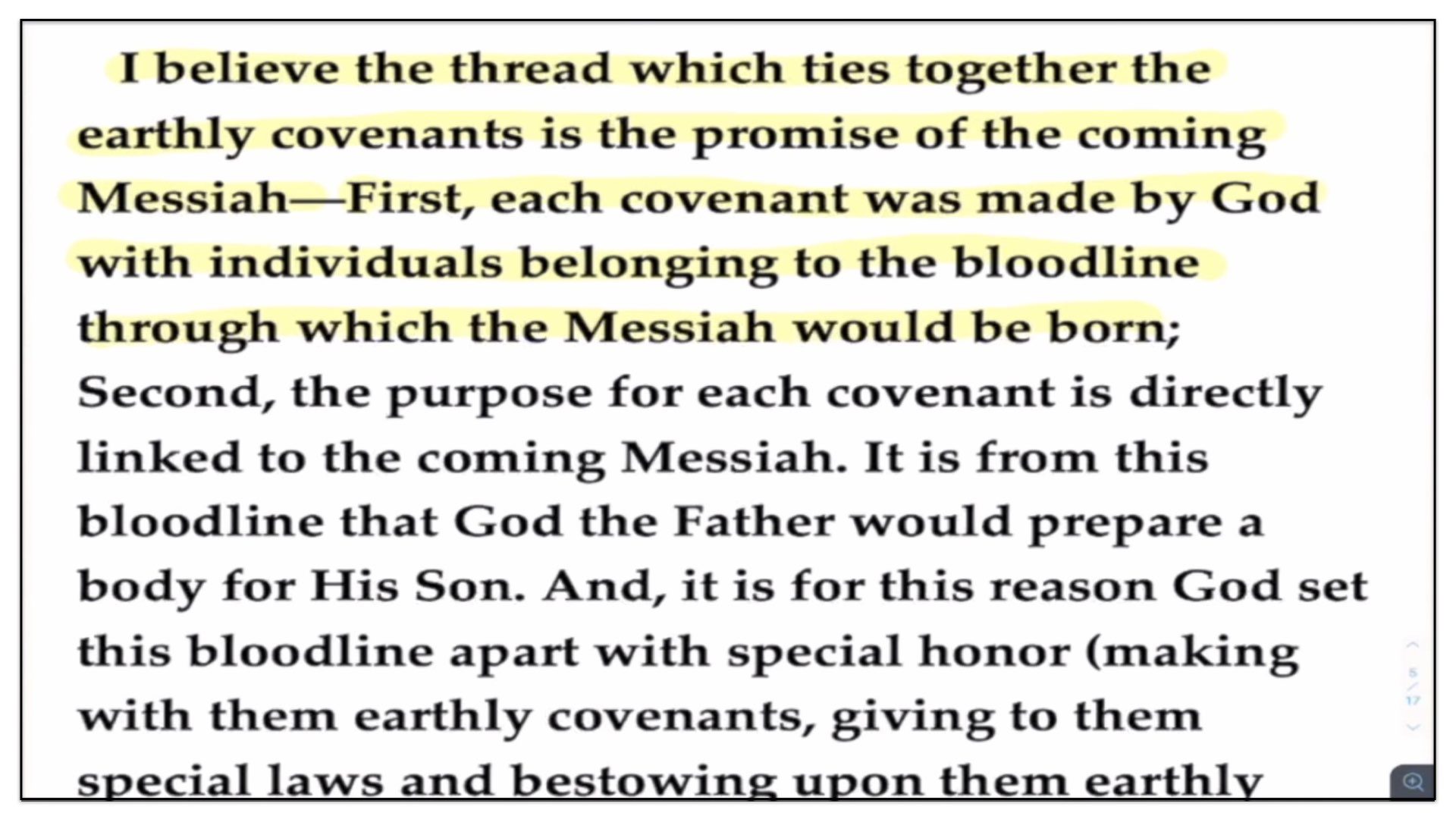
And so the point I’m driving at is simply this—here, let me take you back to the main statement that I’ve given to you—watch this. “I believe the thread which ties together the earthly covenants is the promise of the coming Messiah. And the first observation I’ve given to you on this point—”each of these earthly covenants was made by God with individuals belonging to the bloodline through which the Messiah would be born.” Now, let me pause here before I continue, because I’ve got one more sentence I’m going to cover in this study and then I’ll postpone the study for next time. Let me just mention to you that I’m building slowly the case for my conclusions. I’m giving to you my conclusions in the larger summary statement I read to you towards the beginning of this study. But all of the points I’m here making at the beginning of the statement is laying the backdrop or the foundation for those conclusions. So I would ask for your patience as I unpack these statements for you. Just gather together the pieces of information I’m setting out to you and then when we reach the final conclusions next week or the week after, then you’ll see how all of these loose ends are tied together for the conclusions that I’ll be setting out for you.
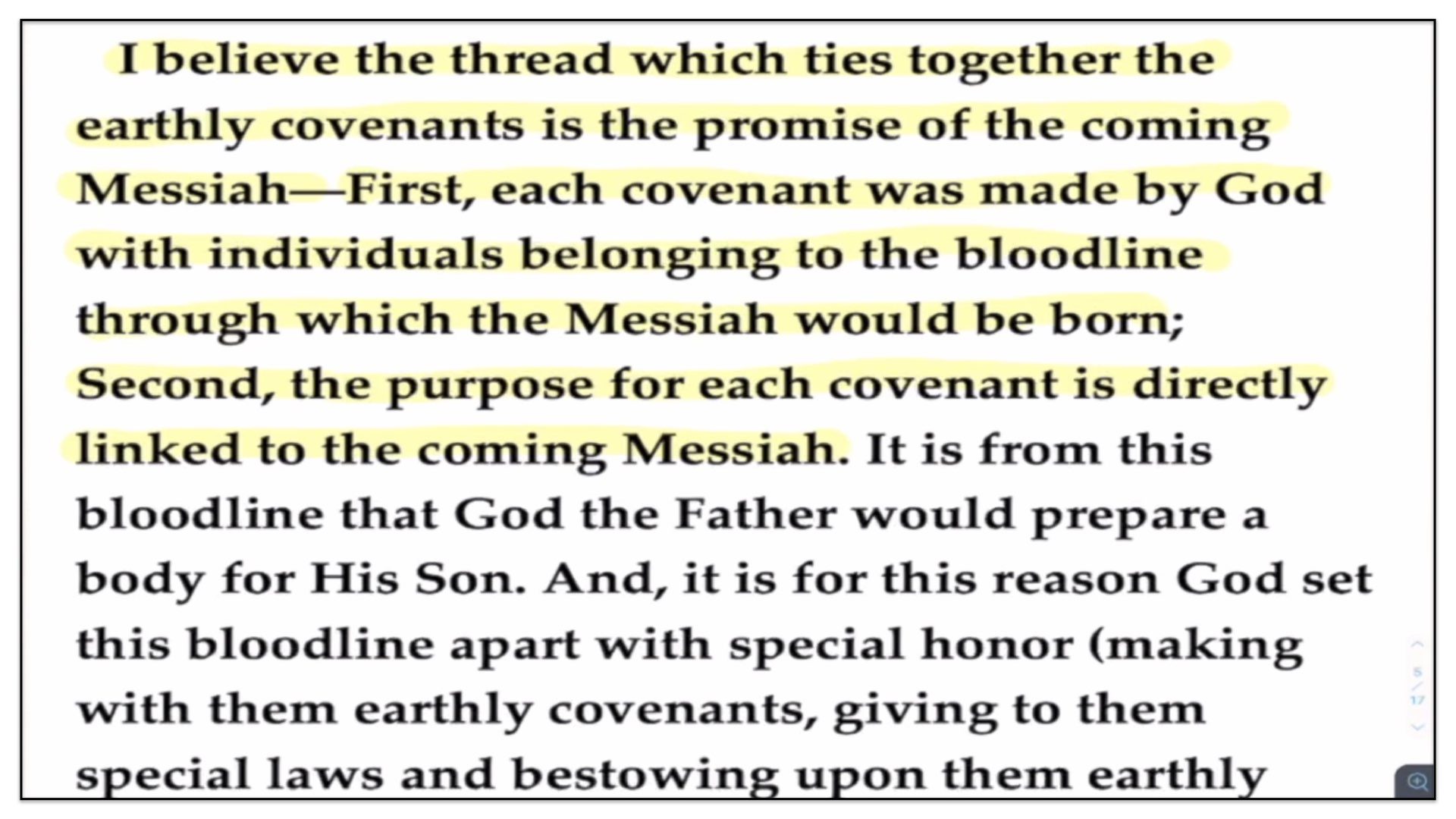
With that said, there’s one other observation I want to make on this point when it comes to the thread which ties together these earthly covenants and it’s this—“the purpose for each covenant is directly linked to the coming Messiah.” The purpose for each covenant is directly linked to the coming Messiah.
The Purpose For Each Covenant Is Directly Linked To The Coming Messiah
The Last Three Covenants—Abraham, Moses And David
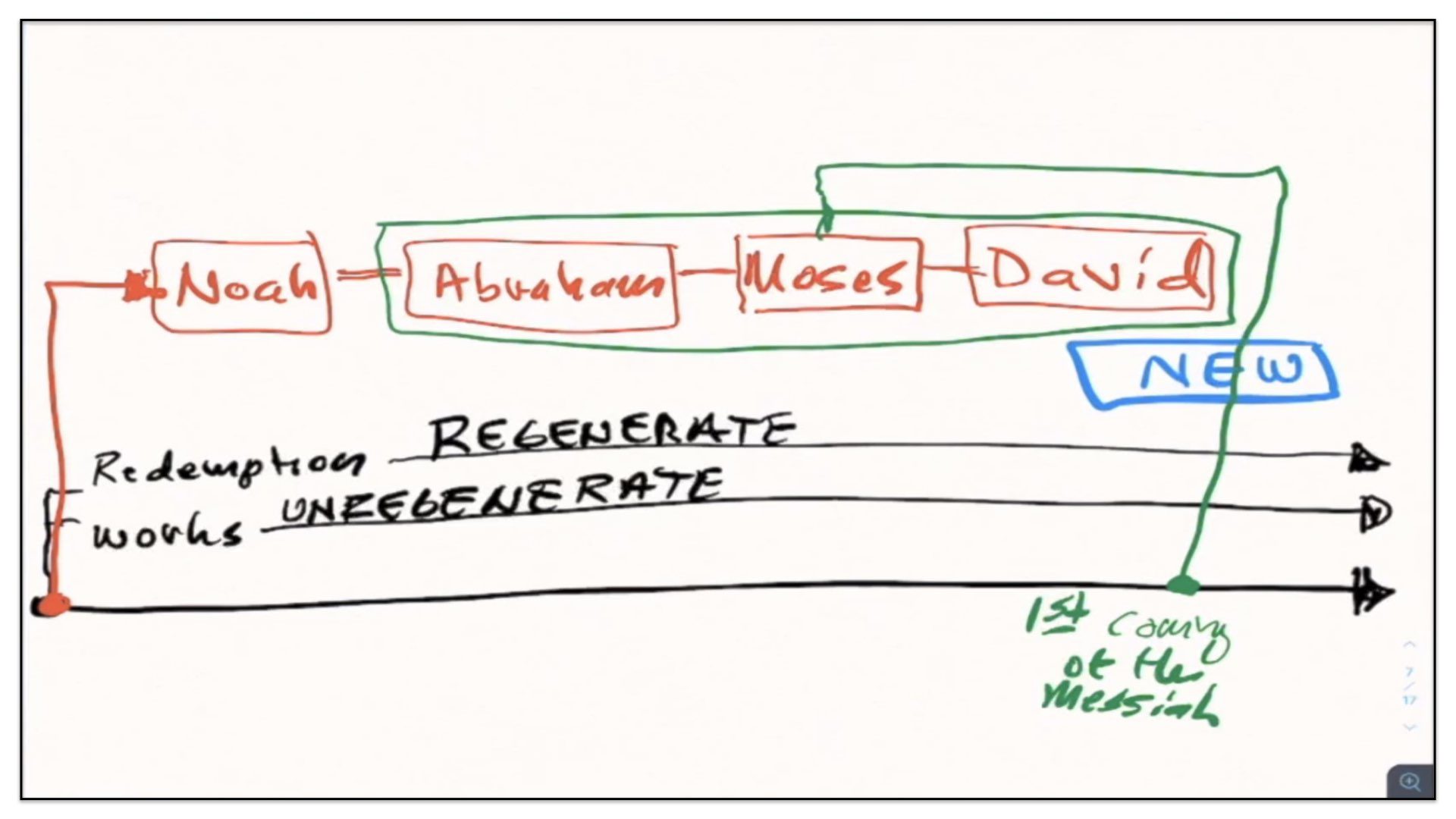
Let me refer you once again to a fresh set of notes for a timeline, diagram, of these covenants. Watch this, the last three—here, let me choose a different color, I’ll choose green again—watch, the last three covenants, the covenants God made with Abraham, Moses and David, each of these covenants point to the promise of Genesis 3:15. Look at the promise again. God said, “And I will put enmity between thee and the woman, and between thy seed and her seed; it shall bruise thy head, and thou shalt bruise his heel.” That is a reference to the first coming of Christ. The seed of Abraham that’s promised in that covenant is none other than the Messiah Himself. The seed of David that’s promised in that covenant again is none other than the Messiah Himself. That’s why, in Matthew chapter 1, it opens with the words, “The book of the generation of Jesus Christ, the son of David, the son of Abraham.” He is the Seed, the Child, the Son of these men. So, the covenant God made with these men point directly to, they’re linked directly with, the actual birth of the Messiah Himself. And the same is true even for the covenant God made with Moses, for though Moses was not a direct ancestor, the covenant God made with Moses was national and racial. And since the Messiah belongs to the Jewish race, so He is included with the covenant God made with Moses on behalf of the Jewish race and nation. Now, there is—let me just mark that down here—so look, these three covenants are directly linked to the first coming of the Messiah. Quite clear, I believe. I’m not going to take the time today, I think next week we’ll have some time to look at more scriptures on this point, but just for today, I’m highlighting for you in general how these covenants point to the coming Messiah.
The First Covenant—Noah
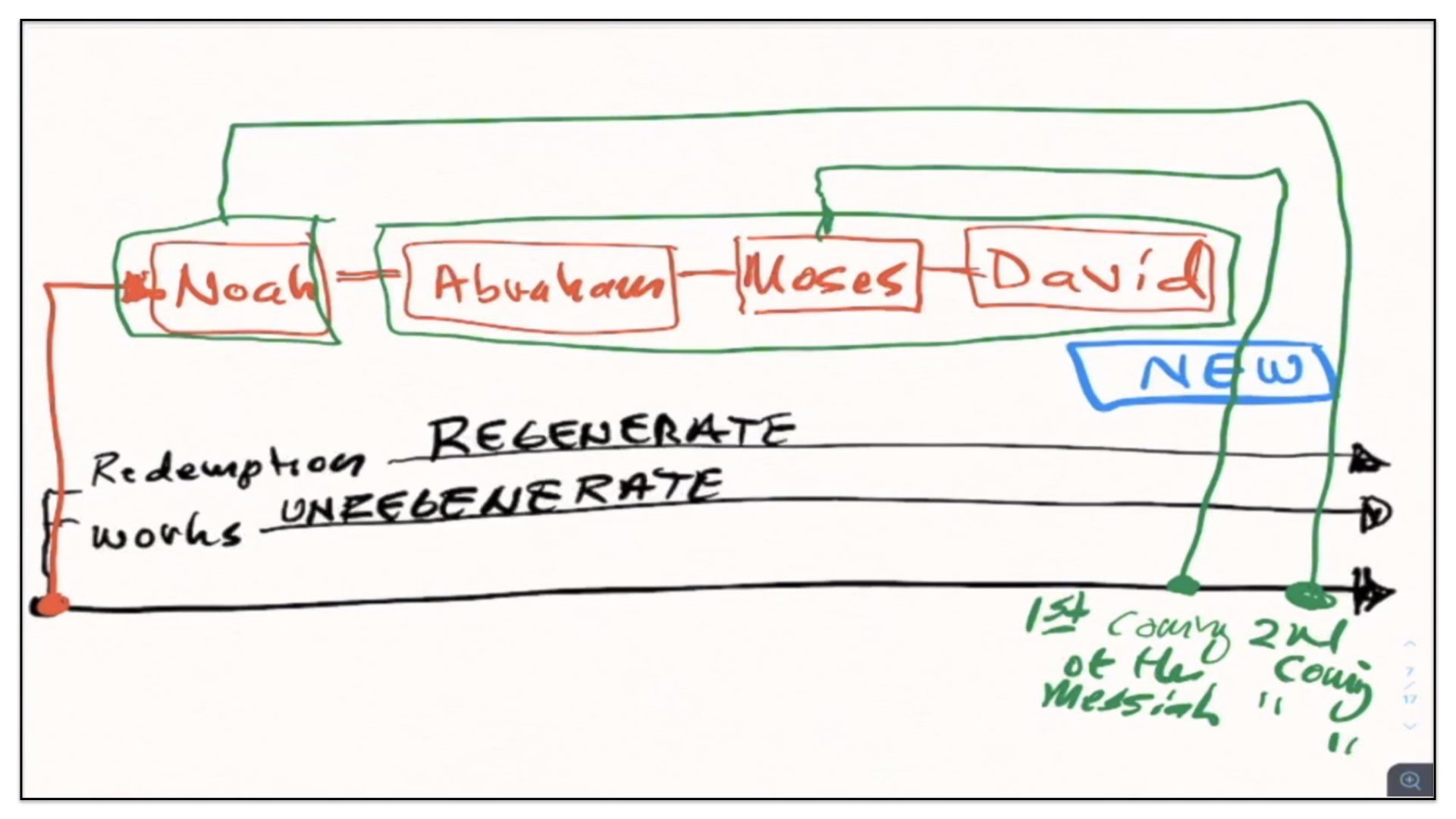
Now, you’re going to ask about this first covenant, this covenant God made with Noah. And you’re going to ask a good question—“How is the covenant God made with Noah linked to the coming of the Messiah?” Well, please listen to me carefully, here, according to the Noahic Covenant, God promised to not again destroy the earth with a flood so long as the earth remains in its current state. Now when you come to the New Testament, the Apostle Peter points out in the third chapter of his second letter that the earth in its current state will come to an end when the Lord Jesus Christ, the Messiah, returns. At that time, Christ will destroy this earth, not with the flood of waters, but with fire. And Christ will create a new heaven and a new earth. Henceforth, watch this, while the Noahic Covenant does not point to the first coming of Christ, and is even to this day active, it hasn’t yet come to an end, the Noahic Covenant. Yet it’s going to end. It’s going to be brought to an end when Christ comes a second time—the second coming of the Messiah. And at that point, the Noahic Covenant will be terminated. And you see, that’s the issues I’m driving at here in this statement. Here’s the first and second coming of the Messiah, two great truths, recorded in the Holy scriptures. And all of these earthly covenants point to those great truths. The first of these covenants, that made with Noah points to the second coming of the Messiah, whereas the last three of these covenants point to the first coming of the Messiah. How often do you step back from the scriptures just to consider the significance of the promise that God has made in Genesis 3:15? The promise of the coming Messiah?
How Can You Link The First And Second Coming Of Christ With The Promise Given In Genesis 3:15?
You know, you may ask a very good question here. You might ask, “How can you link the second coming of Christ with His first coming in Genesis 3:15? After all, is Genesis 3:15 not specific to the first coming of the Messiah?” I believe both comings are included in this promise of Genesis 3:15, and it’s confirmed throughout the Old Testament scriptures. You see, my dear friends, it’s a mistake to assume that the second coming of Christ is a teaching only revealed in the New Testament. The fact is, we find references to the second coming of the Messiah throughout the Old Testament scriptures. There’s one passage in particular I’ll read for you. It’s from the earliest book recorded in the Old Testament scriptures, that of Job, and I’d like to read for you from chapter 19. Now, Job was a contemporary with Jacob. Of course, Jacob belonged to the family lineage of the Messiah, whereas Job did not. In fact, Job did not belong to the Jewish family line at all. He was a Gentile, and yet Job, this Gentile, had been regenerated by the Spirit of God. He was a man who eschewed evil and feared God. He conducted family worship within the confines of his house. He interceded for the members of his family. He exercised a pastoral ministry among those within his household. And then, when he suffered a great calamity in his life and was in an extreme amount of grief, in the midst of that darkness, he gives the following testimony in Job chapter 19, and I’ll begin reading for you in verse 25. (Because of the Bible App I’m using, they often take what they consider to be poetry of scripture and they artificially indent the text and I’ve contacted the makers of this particular Bible App, and I’ve asked them to make changes to it and they’ve refused to do it. So that leaves me with these online notes with a text where words are running along just one word each or running along the side of the Bible text and I apologize for that. But you’ll be able to see the text as I read it to you along the side. Watch.) This is the testimony of Job. He said, “For I know that my redeemer liveth, and that he shall stand at the latter day upon the earth: and though after my skin worms destroy this body, yet in my flesh shall I see God:” Do you see that? “In my flesh I shall see God.” So he’s dead; his soul has been separated from his body; his body has gone to the dirt and returned to it; the worms have destroyed it; and yet Job says, I know, even though my soul is severed from my body, I’m still going to see God with my body, with my flesh. “Whom I shall see for myself, and mine eyes shall behold, and not another; though my reins be consumed within me.” And all of this is talking about the living Redeemer Who’s going to come a second time, and at that point, the Lord Jesus Christ is going to gather all of His people in the clouds in a general resurrection of their bodies. So all of those who have died and their souls have been ushered to heaven, those persons will be reunited with their bodies. That’s what Job is referring to there. It’s the general resurrection at the second coming of the Messiah. You see then, my dear friends, the Old and New Testament scriptures are all about the coming of the Messiah—His first coming as well as His second coming. And I say, that’s the thread which ties together all of these earthly covenants? It is the coming, the physical birth or the physical return, of the Messiah.
A Word Of Caution On How One Should Approach An Understanding Of The Biblical Covenants
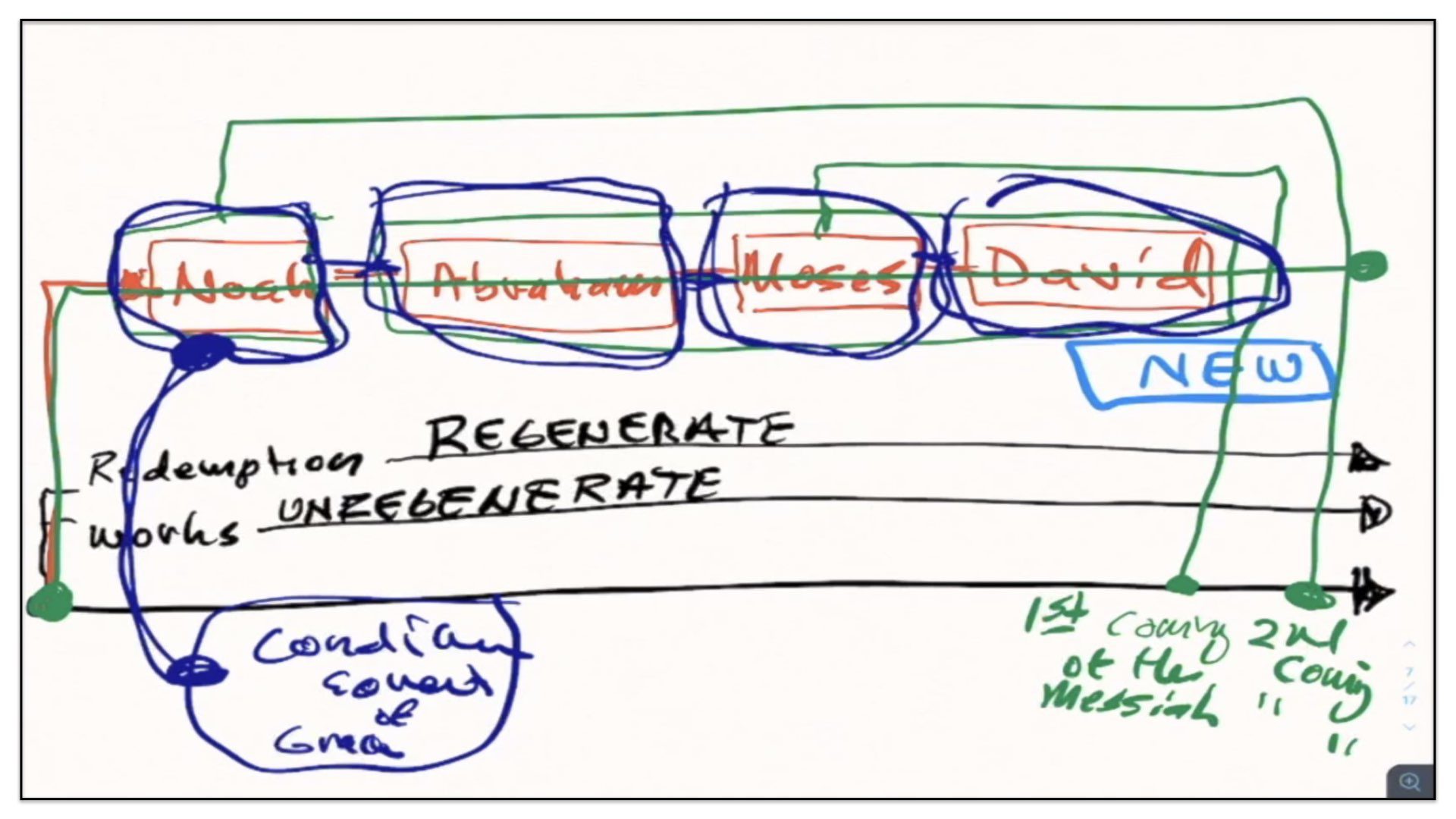
It Is A Mistake To Think Of These Earthly Covenants As Directly Linked With A Conditional Covenant Of Grace
Before I close this study, I’m going to give a final statement to you of being cautious and how we come to understand these biblical covenants. Please listen to me carefully. I believe it’s a mistake to think of these earthly covenants as being directly linked—or, just change color—to a conditional Covenant of Grace—that covenant I mentioned towards the beginning of this teaching. That is a mistake, my dear friends—a mistake to think of these earthly covenants as directly linked with a Covenant of Grace that’s conditional. I’ve already pointed out, I don’t believe such a conditional Covenant of Grace exists. And if you then think that a conditional Covenant of Grace has been republished in each of these earthly covenants, that is a monumental mistake of understanding what the meaning of these covenants are and their significance in the Old and New Testament scriptures. It’s also a misunderstanding of the gospel of God.
It Is A Mistake To Think Of These Earthly Covenants As Directly Linked With The Covenant Of Works
But wait, I’m not finished. Watch. It’s also a mistake to think that these earthly covenants are directly linked with the Covenant of Works, as if they are a republication of this spiritual and perpetual covenant. That’s a mistake, my dear friends. The Covenant God made with Noah is not the Covenant of Works God made with Adam. The Covenant God made with Abraham, Moses and David are not one and the same with the covenant God made with Adam in the garden of Eden. They are entirely separate covenants with different purposes.
It Is A Mistake To Think Of These Earthly Covenants As Directly Linked With The Covenant Of Redemption
Let me also highlight for you and emphasize to you, these earthly covenants, it’s a mistake if you think they are a republication of the Covenant of Redemption. They are not a republican of the Covenant of Redemption. They are entirely separate from the Covenant of Redemption.
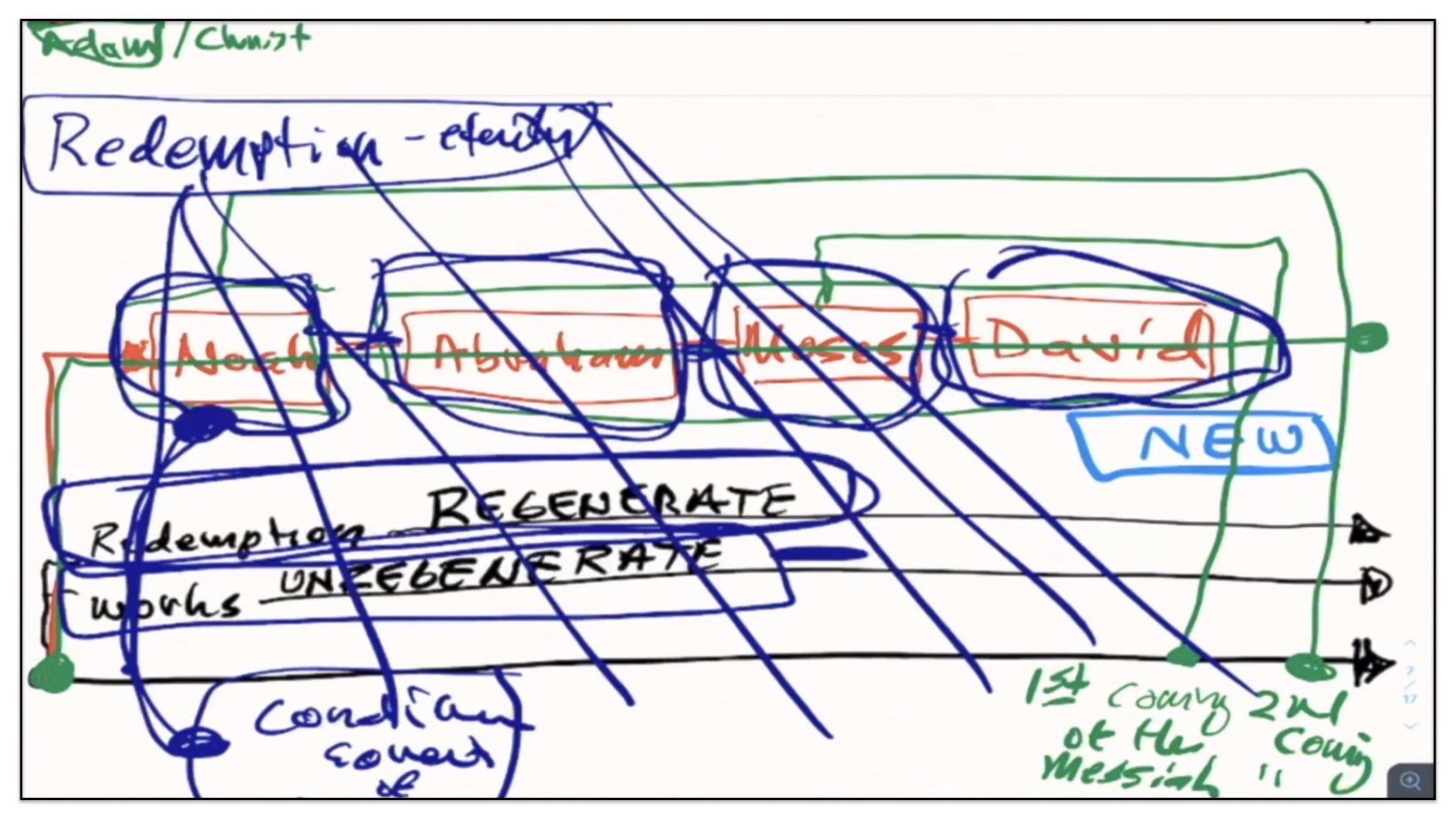
The Covenant of Redemption I’ve put in the previous notes, it exists somewhere up here from eternity. That’s how the Presbyterians and the Reformed Baptist’s view it. I think it’s a mistake to leave it up there for eternity. Of course, that’s where it exists because the Triune Jehovah is eternal. And it’s He Who has drawn this together in agreement between the three Persons of the Godhead, but this covenant is active throughout the course of history, from Adam and Eve to our present day. God is bringing that covenant to pass throughout the course of time. He’s not creating or establishing a New Covenant of Grace that’s conditional. No, He’s bringing about in time His eternal agreement to save His people from their sins.
The Four Earthly Covenants Serve As Signposts To The Two Spiritual Covenants
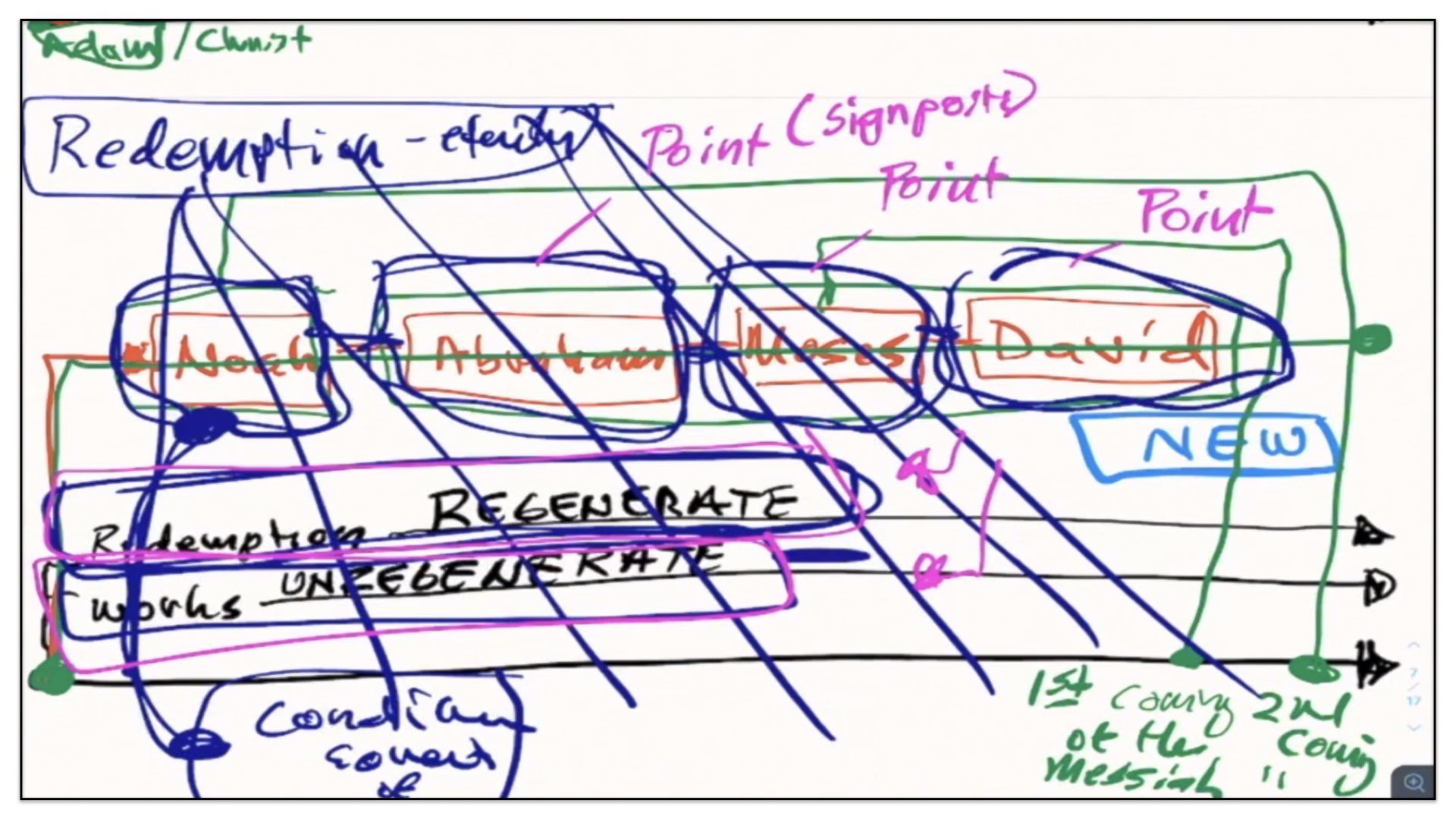
I’m not yet done. I got to add one more thing to this before I close. Watch—let me choose a different color, pink—okay, watch this. These earthly covenants, although they are separate, entirely separate, with the different purpose than the Covenant of Redemption, or the Covenant of Works, watch this. These earthly covenants do point, they point sometimes to the Covenant of Redemption and the Covenant of Works. When I say point, I mean they serve as what could be called signposts. They’re signposts along the road for the Jewish people in particular, pointing from time to time to one or the other of the two spiritual and perpetual covenants. I’ll give you a couple of illustrations of this, or examples rather.
An Example—The Covenant God Made With Moses Points To The Covenant Of Works
Take for instance, the covenant God made with Moses. There is within that covenant a moral law, or the Ten Commandments. Now, these Ten Commandments are signposts, or they point back to the Covenant of Works. Don’t get me wrong. Don’t make the mistake on assuming this—that the Ten Commandments are one and the same with the Covenant of Works. It’s not. The Covenant of Works has its own law. We call it the heart law—to love God supremely and to love our neighbors as ourselves. And you see, it’s based on that heart law that the Ten Commandments were given to the children of Israel—the first four commandments to love God supremely, the last six commandments to love your neighbor as yourself. And these Ten Commandments were a special law to the Jewish people as a nation. But they were based on the heart law under the Covenant of Works. But the Ten Commandments and the Mosaic Covenant are not a republican of the Covenant of Works. Do you see the point I’m making here, my dear friends?
An Example—The Covenant God Made With Moses Points To The Covenant Of Redemption
I’ll give you one more example of this, once again from the Mosaic Covenant. There is also another type of law in the Mosaic Covenant. We call it the ceremonial law. The ceremonial law is that which is linked to the things such as the Tabernacle and its furnishings, the clothings and priesthood, the offerings and the altar and the sacrifices. All of that comes under the ceremonial law. Now watch. Those things pointed as signposts to the Covenant of Redemption. Just signposts. They were object lessons. They were illustrations of the Covenant of Redemption. That’s it. The Mosaic Covenant is not the Covenant of Redemption. Nor is the Mosaic Covenant a conditional Covenant of Grace. On the contrary, the Mosaic Covenant was an earthly covenant with the Jewish people as a nation. It had its own purpose. We’ll discuss that further in the next couple of weeks. But the Mosaic Covenant did point from time to time to the Covenant of Redemption as object lessons of the greater truths the eternal, the spiritual, the perpetual truths, for sinners at large upon this earth.
A Final Word
I Am Asking You To Consider A New Way Of Understanding The Biblical Covenants
Now my dear friends, I have gone into much further explanations with you on some of these points than I was intending, but I don’t regret it. And I don’t apologize for it. What I’m trying to set out for you is a new way of looking at the biblical covenants. I’m asking you to step back from the traditional views of the Presbyterians and the Reformed Baptists, and to have a fresh look at the subject. I’m not even trying to persuade you of my view. I’m just asking you to consider it. Just consider the legitimate points that I’m making here. See if there isn’t a scriptural foundation for it.
My Frustrations With The Covenantal Framework Of The Presbyterians And The Reformed Baptists
You know, I’ve been frustrated for years with the covenantal formulation of the Presbyterians and of the Reformed Baptists, on the order and arrangement and meaning of the biblical covenants. I’ve often felt like David who was brought before Soul, when Goliath was challenging somebody to fight him, and David said, I’ll do it. And Saul said, well, that’s great, let me give you my armor to wear for the battle. And when David tried to put on Saul’s armor, it was too clunky. It was too heavy. David had never fought in something like that before. So he rejected it. He said look, I’ll just go out with my sling. I’ve proven that before and it’s worked for me; by God’s grace, it’ll work again. So David went out with the sling, chose five smooth stones and you know the the rest of the story. Well, I feel similar to that when it comes to these covenantal outworkings of the Presbyterians and the Reformed Baptists. It’s like clunky armor that’s being forced on me. And I’ve tried over the years my very best to embrace those viewpoints, to study the scriptures and to see how it meshes together, and it just doesn’t sit with me. I don’t see how the scripture support the viewpoint of the Reformed Baptists and the Presbyterians when it comes to the subject of these covenants. And therefore, though my view might not be as shiny as the armor of the Presbyterians and of the Reformed Baptists, it might only be a sling with five smooth stones, yet it works for me. And I believe that this is a much more consistent and faithful understanding of the covenants, than what the others have to offer us.
Creeds And Confessions Are Not Infallible Documents
Now, I know of course, the Presbyterians and the Reformed Baptists have their creeds and confessional statements, don’t they? And they’re always quoting from them. You know what I find odd about that? Presbyterians and the Reformed Baptists love to say sola scriptura. Now that’s a Latin phrase which means only scripture, or scripture alone. And yet if you ever listen to a Presbyterian or Reformed Baptist teach, they’re always going back to their confessional statements, quoting the confessions. In fact, I’ve often heard them interpret portions of the Bible based on their confessional statements. Think of that! They interpret portions of the Bible based on their confessional statements. If you listen to them talk about the writers and the signers and the compilers of those confession statements, you would come away from them thinking that those men of the 17th century were inspired. They seem to put those guys on a pedestal similar to that of the Prophets for the Old Testament and the Apostles of the New Testament. And then, if anyone dare deviate from those 17th century statements, it’s a red flag of heresy. How dare us even question the 17th century reformers!
We Must Examine All Views In The Light Of Scripture And Yield To The Teaching Of The Holy Spirit
My dear friend, I don’t trample on the testimony of the reformers. I have high respect for them. I stand on their shoulders. I love their writings. But we’re all men. I get it wrong. You get it wrong. They get it wrong. And we must be willing to approach the scriptures always with a fresh view, not rejecting the older views quickly, but with caution, examining them under the light of scripture and then if we find the scriptures taking us down a different path, we should be willing to set aside the statements of men and follow the clear teachings of what the Spirit of God gives to us from His word. And that’s all I’m asking you to do in these studies. Just with an open mind, approach the scriptures with a fresh perspective. If at the end you considered the teachings I’m setting out for you to be unscriptural, reject it! Continue to embrace the old views of the Presbyterians of the Reformed Baptists. But if you find some legitimate points here, and you might not agree with it all, then perhaps you’re going to find yourself shifting your own views where you’re not necessarily embracing the views I’m setting out to you, but you’re also not just blindly accepting the views of the Presbyterians and the Reformed Baptists. Perhaps you’re going to see things slightly differently, and I think that’s perfectly fine. If we’re being led by the Spirit of God and we’re sincerely handling the scripture with care, proper principles of interpretation and under His blessing, then I think there should be room for us all to come at the table and discuss our differing views showing respect to one another and in a spirit of love being able to disagree with each other but knowing each and every one of us are fallible and none of us have a monopoly on the truth. God does, but not me and not you. Certainly, not the reformers.
Alright, my dear friends, I hope I’ve made these things clear enough to you. I want to wish upon you every blessing in the Lord, and when we meet again next time I’ll pick up where we’ve left off from this study and I’ll be considering the final part of this paragraph. Until then, may the Lord richly bless you.
Jared Smith served twenty years as pastor of a Strict and Particular Baptist church in Kensington (London, England). He now serves as an Evangelist in the Philippines, preaching the gospel, organizing churches and training gospel preachers.
Jared Smith's Online Worship Services
Jared Smith's Sermons
Jared Smith on the Gospel Message
Jared Smith on the Biblical Covenants
Jared Smith on the Gospel Law
Jared Smith on Bible Doctrine
Jared Smith on Bible Reading
Jared Smith's Hymn Studies
Jared Smith on Eldership
Jared Smith's Studies In Genesis
Jared Smith's Studies in Romans
Jared Smith on Various Issues
Jared Smith, Covenant Baptist Church, Philippines
Jared Smith's Maternal Ancestry (Complete)




